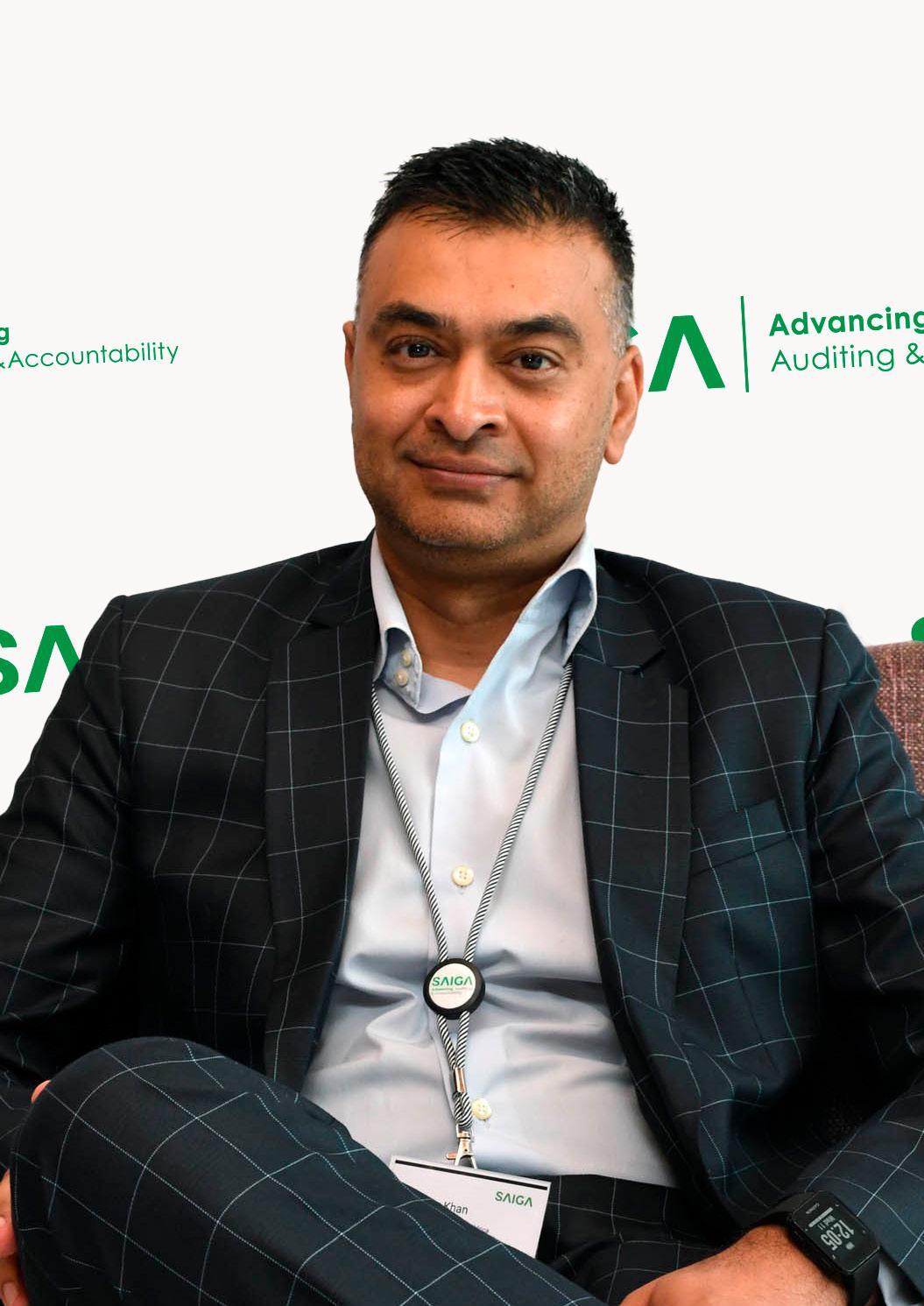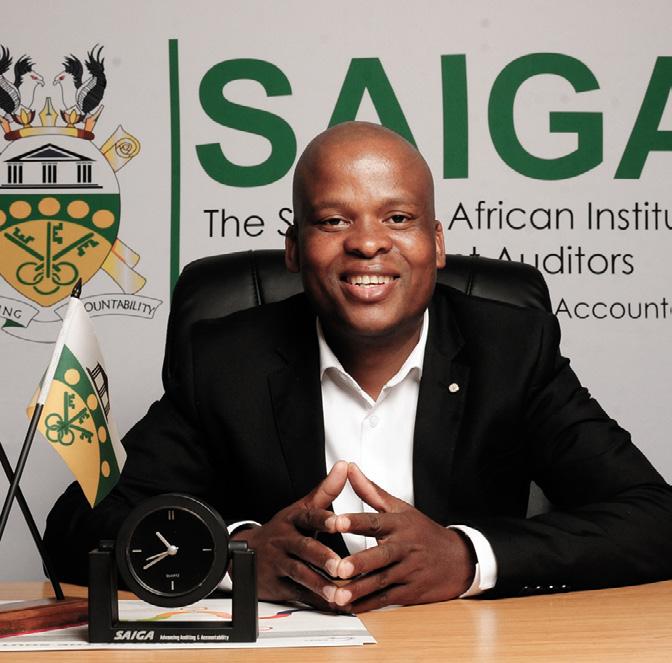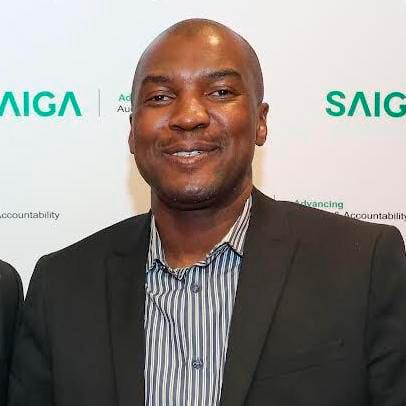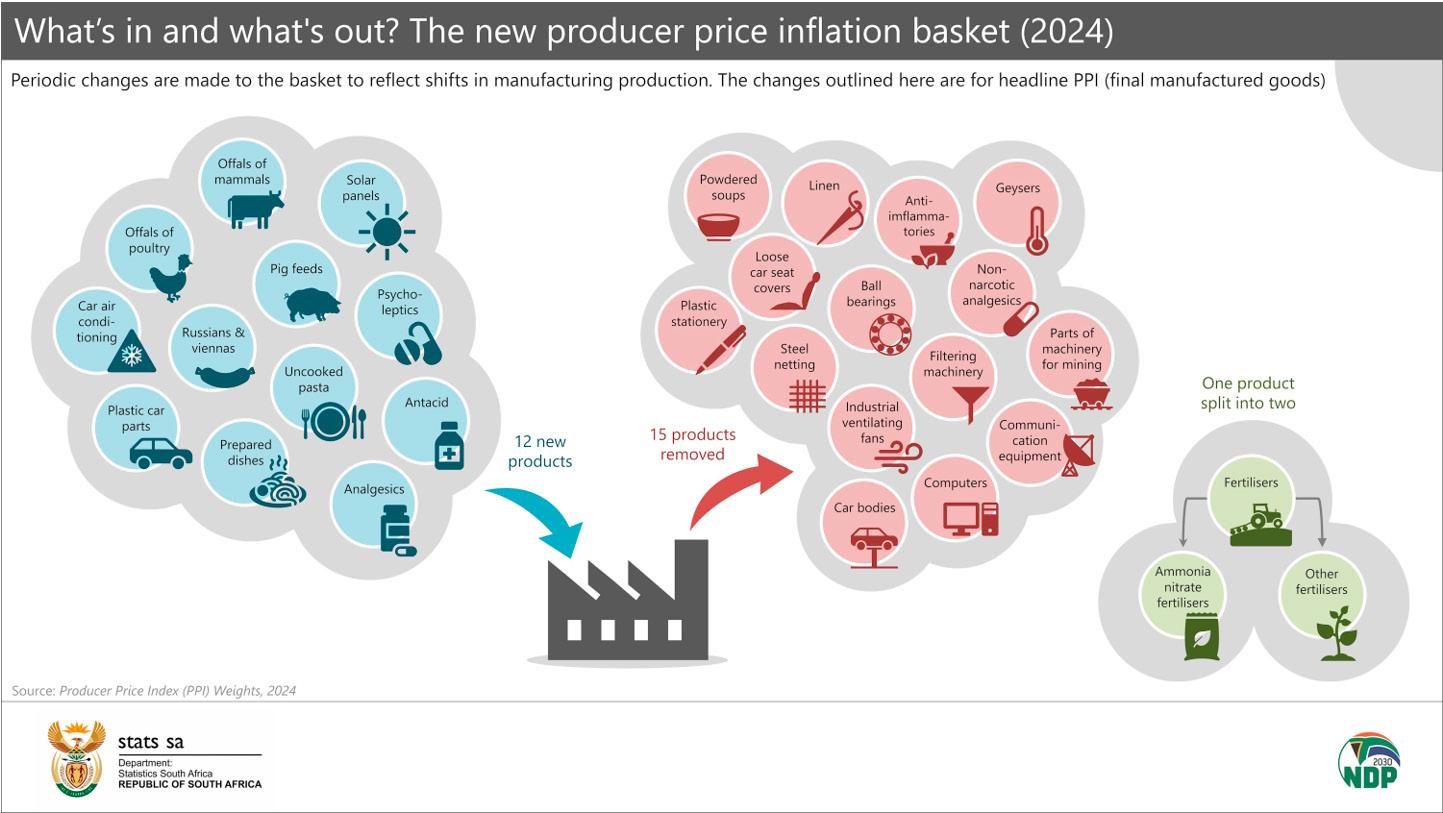
AUDIT DISCLOURE PRACTICES
Analysis of disclosures in metropolitan municipalities
PERFORMANCE AUDITING IN SA
Key driving factors behind the ever-increasing demand
THE VITAL INTERPLAY
Tax practitioners & audit firms navigate tax terrain SHABEER
Why it is not a strategy?
Apr - Jun 2024 Edition: Vol 8 Advancing Auditing &Accountability
fit
KHAN Accountant-General The perfect
SA BANKING SECTOR
The need for platform business AUDIT COMPLACENCY
South Africa 19942 0 42




4 www.saiga.co.za Editorial Director: Kgomotso Sethusha Contibutors: Cobus Janse van Rensburg Nadia N Kganakga Danie Schutte Lorraine E Derbyshire Dr Lethiwe Nzama-Sithole Lungisani Bhengu (RGA) Richard Chambers Ashley Nyiko Mabasa Adv Annamarie van der Merwe Tumelo Letlojane Patrick Kelly Kevin Parry Kemi Mathatho Hügo Krüger Sdumo Hlope Winnie Senoamadi Christopher Vandome Julius Mojapelo Sales Director: Nardine Nelson nardine@kwedamedia.co.za Publishing Partner: Kweda Media www.kwedamedia.co.za Editorial Enquiries T: 012 004 0741 E: researcher@saiga.co.za Advertising Enquiries T: 082 739 3932 E: auditingsa@kwedamedia.co.za CONTENTS 06 CEO’s Note 08 Letter from the Editor 10 SHABEER KHAN Accountant-General - The perfect fit 16 Performance Auditing 20 Audit Committee 26 Municipal Performance 30 Tax Matters 32 Audit Complacency 36 Banking Sector 38 Corporate Governance 42 District Development Model 44 Stats SA 46 Risk Management 50 Energy Factor 54 Digital Auditing 56 2024 SA Elections 58 Public School Audits 60 IAASB 62 Trivia CONTRIBUTORS DISCLAIMER: Auditing SA is published by the Southern African Institute of Government Auditors (SAIGA): www.saiga.co.za, PO Box 36303, Menlo Park, 0102, South Africa, Tel: 012 004 0741, WhatsApp No: 069 5387276, Editor: Kgomotso Sethusha email: researcher@saiga.co.za SAIGA accepts no responsibility for any loss incurred by any individual acting or refraining from acting as a result of any material in Auditing SA. SAIGA cannot accept responsibility for any opinions expressed by contributors, nor for the accuracy of the information contained in articles, contributions, advertisements or other material. The editor reserves the right to edit material. COPYRIGHT NOTICE: All rights reserved. No part of this electronic publication may be reproduced by any means without the written permission of the publishers. This includes making photocopies or uploading portions of the publication. Extracts of reasonable length may be made for personal research purposes. ISSN: 1028-9011




WE ARE BMW KEMPTON PARK
As a BMW driver, you have certain expectations when it comes to customer service. At BMW Kempton Park, we make it our mission to exceed them every time.
All our team members are professional, passionate and friendly - and we're proud of the trust that's been placed in us by our customers and our community.
We like to go above and beyond in terms of enhancing your BMW experience. As one of our Premium Members, you can look forward to:
Invitations to exclusive events, including launches and test drives in the latest BMW models. Preferential service bookings and while you wait servicing (on request).
Competitive pricing on all BMW Lifestyle Collection items. A Sales Executive dedicated to your account. It all adds up to a superb experience, because noone is more important to us than you are.
We look forward to being of serviceSimply scan the QR Code below to become a BMW Kempton Park Premium Member.
Where to find us:
BMW Kempton Park Cnr of Brabazon & Isando Rd, Croydon
Tel: +27 11 392-6263
Web: www.bmw-autobahnbmw.co.za
Email hacking, change of bank details and malware are not the work of some super smart hacking geniuses, but rather the outcome of our own bad online habits.
These are the words of Kevin Hogan, a Fraud Risk Specialist at Investec.
You probably hear and read about cybercrime quite often and get to think that “it could never happen to me’.
But reality is that through our behaviour, we inadvertently assist the cyber criminals, who are constantly looking to exploit weaknesses in security systems.
THogan had the audience eating out of his hand at the recent SAIGA Audit and Finance Indaba with his captivating presentation, enlightening auditors, accountants and finance industry professionals about the complex nature of cybercrime, but also how easy it is for one to fall victim to an elaborate scam.
CEO's Note
Cybercriminals are particularly drawn to auditing and accounting firms and other financial institutions, and as Hogan explains, it is unsurprising that cybersecurity has become a top priority for financial institutions, as they are entrusted with safeguarding financial assets.
Even though there is a lot of risk associated with cybercrime, auditors may raise fraud awareness in their companies by empowering themselves with the necessary skills. By so doing, one might potentially prevent or reduce the impact of fraud losses.
CEO's Note
In this edition there is much to learn about cybersecurity and cybercrime for people in the accounting profession and the finance sector to prevent becoming a statistic of the rising cybercrime tide.
he basic relationship between the state and its citizens, in which the state accounts for its actions in terms of how it uses public funds and makes decisions, has broken down. At the heart of this malaise is the lack of accountability and corruption which has crippled service delivery of basic human needs.
This has led to Minister of Justice and Correctional Services Ronald Lamola tabling a bill that seeks to strengthen the National Prosecution Authority’s (NPA) independence and capacity to pursue highlevel crimes.
To illustrate his points, Hogan went further to draw many examples of how scammers were preying on unsuspecting victims as they swindle them of their hard-earned cash, be it individuals with low digital literacy and institutions with top-notch cyber security systems. Truth is, South Africa is one of the countries under cybercrime attack, and auditors are facing evolving cybersecurity challenges.
In her keynote address, Gcaleka hammered home this point even further by emphasising the crucial role auditors and accountants play in fostering openness, accountability, and public trust in institutions.
You can also read about how auditors can build skills and capacity in the digital era where these tools have become essential, and find out how technology can be used to improve performance and help municipalities achieve clean audits.
If passed, the bill will see the establishment of the Investigative Directorate Against Corruption, targeting among other cases, the ‘state capture’ crimes.
It will ensure the effective implementation of the recommendations from the State Capture Commission as it will allow the NPA to apply the experience gained from South Africa’s efforts to tackle high-level corruption.
South Africa ranked number five globally in a list of countries worst affected by cybercrime, with 56 000 out of every million internet users being a victim.
Her views are fully detailed in the cover piece of this Spring edition.
The edition also contains interesting and thoughtprovoking articles, that, however, are not limited to auditing and accounting, but also cover politics and health issues, in light of the current water crisis.
You may also read about how improving audit outcomes in South Africa is a multifaceted endeavour that requires addressing challenges, upholding independence, embracing technology and promoting transparency.
Make sure you participate in the first-ever SAIGA Anti-fraud and Corruption Dialogue later this year, where we will discuss cybersecurity-related ideas and strategies that businesses and other organisations should use in an era where one’s worst financial nightmare could be just a few minutes away.
Has the AI summer arrived? Find out why leading players in the audit sector are starting to experiment with various AI-driven tools to improve audit processes, and many more.
Enjoy your reading!
Russel Morena SAIGA CEO
All in all, this bill is an essential step in reinforcing South Africa’s anti-corruption efforts and ensuring that those suspected of corrupt activities are held accountable.
This was one of the main takeaways from Lamola’s presentation at the 3rd Annual SAIGA Conference, which was held at Emperors Palace last month.
According to a study commissioned by cybersecurity company Surfshark, 2 000 South Africans fell victim to cybercrime last year alone.
Themed “Advancing auditing and accountability for citizens and the future,” the conference, which coincided with SAIGA’s 35-year anniversary celebrations, brought together auditing and accounting professionals, politicians, opinion makers and thought leaders.
The study revealed that R2.2 billion is widely quoted as the figure for the substantial amount of money lost annually to cybercrime in South Africa, a figure from a report released by the South African Banking Risk Information Centre (Sabric) released back in 2013, but likely to have increased substantially since then.
These included among the many speakers and panelists, the Acting Public Protector, Adv Kholeka Gcaleka, Deputy Auditor-General Vonani Chauke, CEO of IRBA, Imre Nagy, Prof Mabutho Sibanda, SARS Deputy Commissioner Bridgette Backman, the CEO of PwC, Shirley Machaba and Dr Liezl Groenewald from the Ethics Institute.
It is a grim picture, one which should leave everyone concerned. Scammers become innovative just as forensic investigators work tirelessly to dismantle organised crime groups.
This year, we revisited the principles that have remained central to SAIGA’s existence as we ignited meaningful discussions around the critical role that auditors play in the public and promoted the core values of this Institute.
Russel Morena SAIGA CEO

6 www.saiga.co.za
6 www.saiga.co.za

Letter from the Editor
The month of April is no ordinary month in the history of South Africa.
This month marks exactly 30 years since the day hundreds of thousands of people stood in snaking queues under the scorching sun to cast their votes and usher in a new era of democracy in our country.
As the country celebrates 30 years of democracy, many industries and professions will naturally be reflecting on the journeys they too have travelled, many having transitioned from the dark days of apartheid to democracy thereby giving birth to what the late Archbishop Desmond Tutu termed the rainbow nation.
The auditing, accountancy and finance professions can reflect on how it has intrinsically contributed to the democracy of the country, its solidification, and how it positioned the republic as a respected global citizen.
It was not long after that the Auditor-General of South Africa (AGSA) was established as a Chapter 9 institution - one of the state institutions supporting constitutional democracy in the Republic of South Africa.
The institution underwent reforms brought about by the new constitution - enacted in 1996 – that necessitated the Auditor-General to incorporate the pre-1994 Auditor-General offices of the former Bantustan, TBVC independent states into the South African office.
The huge task, overseen by Auditor-General Henri Kluever, marked the start of the modernisation changes in the Public Finance Management Act of 1999 and the Municipal Finance Management Act of 2003.
The legislation sparked a revolution in the South African public sector and, thus, in the Office of the Auditor-General through several notable provisions, the effects of which are still being felt today.
The Public Audit Act amendment bill, signed into law by President Cyril Ramaphosa, now gives the AGSA more power to act against officials and employees who waste public funds and those who turn a blind eye to the misappropriation of taxpayers’ money instead of prosecuting them.
Before, the Act did not provide scope for auditors to focus on material irregularity, but only on audit outcomes and deviations.
You can read more about the strides of the professions in our front cover story penned by the Accountant-General of South Africa, Shabeer Khan.
Also, read about performance auditing services as it reflects the country’s ongoing efforts to enhance accountability and efficiency amid various economic, political and social challenges. The featured article examines the status of the demand for performance auditing services in South Africa, exploring the key factors driving this demand and challenges faced in meeting it.
Learn more about the challenges facing our banks which may result in them being overlooked; such as the banks’ traditional operating model, slow pace of innovation, and highly structured business approach.
Technology has become an essential part of our daily lives, affecting the way we work, communicate and the way we interact globally and there is no denying that integrating technology into municipalities in South Africa has the potential to improve local government operational efficiency. Read more about how municipal performance can be elevated through technology to achieve clean audits.
And, as South Africans prepare to go to the polls, read about how uncertainty of coalition government is a significant political risk in 2024. The article delves into the configuration of potential national and provincial coalitions as they will be determined by the number of votes and seats needed rather than ideological compatibility.
Kgomotso Sethusha Editor

8 www.saiga.co.za


Nedbank is committed to being the business banking partner for the public sector. Our bigger-picture approach to banking is designed to provide groundbreaking solutions for your municipality. With the expertise and knowledge of our community specialists, we can ensure continuity, accessibility and quick decision-making that guides your business growth.
Think bigger.

Think Nedbank Commercial Banking. For more information email us at publicsector@nedbank.co.za.












Nedbank Ltd Reg No 1951/000009/06. Licensed financial services and registered credit provider (NCRCP16). Terms and conditions apply.
Want a bank that’s serious about public sector growth?
33054/R
Commercial Banking



Advancing Auditing &Accountability COVER STORY 10 www.saiga.co.za


SOUTH AFRICA’S ACCOUNTABILITY ECOSYSTEM IS EFFICIENT
Kgomotso Sethusha Auditing SA Editor-in-Chief
s he notches a year in office, South Africa’s Accountant-General
Shabeer Khan can reflect on his tenure with a deep sense of satisfaction.
approved the appointment of Khan to take charge of head the Office of the Accountant-General (OAG), a division within the National Treasury that derives its mandate from the republic’s constitution.
Ronald Lamola SA Minister of Justice and Correctional Services
It was in mid-2022 that cabinet
Khan was to fill one of the two vacant but crucial positions at Treasury, beginning his tenure eight months later, as government

sought to turn the tide against graft in the delivery of public service by strengthening key institutions.
Since then, Khan has not looked back. Instead, he has taken the initiative to lead and provide strategic direction to a group of competent practitioners, supporting the responsible use of public resources, forming partnership >
Advancing Auditing &Accountability
11 Auditing SA
with stakeholders as well as advocate for good public financial management.
“It has been about a whirlwind year in which there has been a lot to learn and contribute,” says Khan.
“We have made significant strides in advancing the work done in the planned legislative reforms, reignited significant relationships that will help us do our job as well as started the process of positioning the Office of the Accountant General (OAG) as the first point of call when it comes to public finance management.
“We are a long way from achieving our goals, but we are well on our way, and I believe we will achieve what we have set out to achieve.”
It is quite a considerable task for Khan, who is charged with the responsibility to facilitate accountability and governance by promoting transparent economic, efficient and effective management in respect of revenue, expenditure, assets and liabilities in the South African public sector.
Even though Khan defied the widely held assumption that public service doesn’t typically attract chartered accountants, he did so consciously and deliberately to better his country.
The National Treasury has suffered a brain drain over the last decade, the political upheavals accounting for the exodus of skilled and experienced public service officials who left government for the private sector.
Khan explains: “The perception seems to be, that working for
government can be a risky career choice but honestly, it provides an opportunity where you can enhance your skills. In fact, when I joined the Department of Trade and Industry and Competition (DTIC), I was the only chartered accountant in the whole department. I am pleased to say that more and more chartered accountants are in fact, now looking at the public sector.
“Working for government a conscious decision for me” - Shabeer Khan - Accountant General
“I am a public servant at heart, and over and above that I am an accountant. Given the trajectory that my career had taken, it was almost logical that I would end up at National Treasury or in a position in government.
“For me, the role of the accountantgeneral provided me with the opportunity to make a difference, to bring my experience to bear and to especially as a former practitioner, to influence the policy side, to simplify accounting and reporting as well as learn new lessons.”
Experience remains key
But Khan could draw on his experience in the public sector, having served as the CFO of the DTIC where he successfully managed a R10 billion budget in the execution of the department’s strategic mandate, achieved the first ever clean audit in 2015 and subsequent clean audits, provided leadership to the finance team and created a strategic risk
management and compliance function.
“My background and experience gained from my various positions at the AGSA stood me in good stead in my role as the CFO,” says the 2015 CFO of the Year Awardwinner.
“If anything, I had the benefit of knowing the other side of the accountability ecosystem. I had been involved in many audits as a trainee and later as a senior in the auditing profession and I had an idea of what to expect.
“Achieving a clean audit outcome is always a culmination of various processes, contributions from many people as well as collaborations with various role players. Obviously, as the CFO I was responsible for coordinating and guiding the team. In addition, I had to maintain strict controls and ensure that all role players comply with the policies and procedures, as well as prescripts.”
He is surrounded a similarly competent team at the OAG, a sizable staff that handles a range of legal and technical tasks to guarantee adherence to the Municipal Finance Management Act (MFMA) and Public Finance Management Act (PFMA).
Key to this is the Financial Management Capability Maturity Model (FMCMM), is a diagnostic tool that the OAG uses to measure the financial performance of departments, state owned entities and municipalities. These assessments are aimed at determining the capabilities with these organisations in PFM ‘so as to correctly prescribe the

Advancing Auditing &Accountability 12 www.saiga.co.za
COVER STORY
necessary interventions by the OAG as well as other interested parties’.
“The OAG generally has a good complement of practitioners that have a lot of experience in working in the public sector. One of the advantages we have is to be able to grow our own timber and in promoting people to higher positions within the OAG,” Khan shares.
“This guarantees continuity. There are opportunities to bolster the resources we have as well as to strike collaborative relationships with like-minded organisations to ensure that the OAG has wider reach and can be as effective as possible.”
The ecosystem of accountability in the country has since proven to be efficient, strengthened by structures such as Tri-lateral, which is comprised of the OAG, AuditorGeneral of South Africa (AGSA) and the Accounting Standards Board.
There has also been a discernible shift in the efficiency of the country’s law enforcement agencies that support the work of ensuring that those who are involved in corruption face prosecution.
Auditors and accountants are equally accountable for the economic well-being of the country. They identify corrupt practices in the public and private sector and combating graft through the advancement of efficiency and transparency.
Professional bodies also have a role to play as they are critical to holding their members accountable as well as ensuring that they

are kept abreast of the latest developments in their profession.
“Even more importantly, professional bodies should inculcate values that are true to what they profess to believe,” adds Khan, who holds a Bachelor of Commerce from the University of Witwatersrand.
As South Africa celebrates 30 years of democracy, Khan looks back at the role accountancy has played in entrenching the democracy of the republic in the country. He, too, has cause to celebrate, explaining: “The enactment of Public Finance Management Act and the Municipal Finance Management Act and related prescripts have ensured accountability and good public financial management are some

of the achievements over the years. “In addition, the regulation of the auditing industry by IRBA as well as peer-led monitoring by the professional bodies has generally given confidence to the markets as well as investors about the security of their investments.”
Is there reward in the public finance management field?
“The reward really comes from knowing that one is making a difference to the lives of ordinary people citizens of our country. Good governance contributes to accountability and ensuring that the resources of our state are utilised for the benefit of its citizens. Ultimately our role as the OAG is to make sure that the benefits of our work accrue to the people,” Khan concludes. >
13 Auditing SA Advancing Auditing &Accountability
SHABEER


Advancing Auditing &Accountability
14 www.saiga.co.za COVER STORY

SHABEER
KHAN
Cabinet appointed Mr Shabeer Khan as Accountant-General as of the 1st of January 2023.
Mr Khan has over 17 years’ experience in the public service.
Mr Khan is a Chartered Accountant and a member of the South African Institute of Chartered Accountants (SAICA).
He started his articles in 2002 as a Trainee Clerk with Fazel & Associates and then moved to the Office of the Auditor-General in 2004 where he rose through the ranks to become a Senior Manager.
Shabeer joined the Department of Trade, Industry and Competition (the dtic) as the Chief Financial Officer in 2013. He was appointed as the Acting Director-General in 2022, a position he held until he joined the National
Treasury.He is a member of the Financial Reporting Standards Council (FRSC); and has served on various boards as an Independent non-executive Director, as well as a number of audit committees.
Mr Khan has a Bachelor of Commerce Accounting from the University of the Witwatersrand and Honours Bachelor of Accounting Science (CTA) from the University of South Africa.
He has extensive experience at a senior managerial level in public sector which will benefit the National Treasury immensely.
Shabeer is a devoted family man, married and the proud father of four children. He believes in creating a healthy balance between his two passions, supervising public balance accounts and spending quality time with his family.

15 Auditing SA Advancing Auditing &Accountability
THE EVER-INCREASING DEMAND FOR PERFORMANCE AUDITING IN SA
Cobus Janse van Rensburg, Certified Internal Auditor
In South Africa, the demand for performance auditing services reflects the nation's ongoing efforts to enhance accountability and efficiency amid various economic, political and social challenges. This article examines the status of the demand for performance auditing services in South Africa, exploring the key factors driving this demand and challenges faced in meeting it.
Performance auditing is an essential aspect of ensuring accountability, transparency, and effective governance within public sector organisations and is distinct from financial auditing as it focuses on evaluating the so-called “Three E’s” (economy, efficiency, and effectiveness) of operations, programs, or activities.
Performance auditing aims to provide stakeholders with essential information regarding the achievement of objectives, and the prudent use of resources.
Performance auditors assess whether organisations are delivering services effectively and efficiently, identify areas for improvement, and recommend corrective actions. Although performance audits are conducted in both the public and
private sectors, this type of audit is more prevalent in the public sector. The main reason for this is because the public sector does not have the “built-in” performance measure of profit.
As the main mandate of public sector organisations relate to service delivery, performance measurement becomes more subjective and complicated. For example, different stakeholders may have different ways to define quality education, which is only one of the many public sector objectives.
Performance auditing aims to assist in overcoming this challenge by independently evaluating the measures implemented by management to ensure that government objectives are achieved (effectiveness) and that these objectives are achieved by utilising public resources in the most economical and efficient way possible.
There are many factors that drive the demand for performance auditing in South Africa. The three main drivers are briefly discussed below:
Government accountability
With a history of governance challenges, corruption scandals, state capture and inadequate service delivery, a greater emphasis is placed on enhancing accountability
within government organisations. Performance audits play a crucial role in evaluating the effectiveness of public policies and programs, ensuring that taxpayers' money is utilised efficiently.
Government organisations are also forced to account for inadequate performance, as the Auditor General of South Africa (AGSA) performance audit reports are public documents.


16 www.saiga.co.za Advancing Auditing &Accountability
PERFORMANCE AUDITING
Regulatory requirements and audit plans
Although performance auditing is not required by law like its financial audit counterpart, it is also mandated by the AGSA to assess the performance of all government departments.
Additionally, internal audit functions of public sector organisations are also including performance audits in their annual internal audit plans. Compliance with these mandates and plans drives the demand for audit services.
Economic development
As South Africa strives for economic development and social progress, there is heightened scrutiny on the performance of public services, infrastructure projects, and
development initiatives. Performance audits assist with the identification of bottlenecks and inefficiencies that hinder progress. Furthermore, one of the main objectives of public sector organisations is to achieve the largest possible outcomes with as little resources as possible.
As economy and efficiency are two of the main three pillars of performance auditing, these audits can greatly assist the public sector to achieve this.
Challenges facing the effective delivery of performance audits
Despite the increasing demand for performance auditing services, several challenges hinder their effective delivery. Firstly, as performance is defined differently
for each category of service delivery, a skill shortage of sector-specific expertise exists, especially in specialised sectors such as healthcare, education, and infrastructure. Most performance auditors come from a financial background and lacks the specific skills required to understand the intricacies of these sectors. On the other hand, sector specific experts may not always fully understand audit related processes. A clear need exists for the development of “all-rounder” performance audit professionals.
Secondly, thorough performance audits are generally quite costly. >
The demand for performance auditing services in South Africa reflects a growing recognition of the importance of accountability, transparency, and effective governance in driving socio-economic development.


17 Auditing SA Advancing Auditing &Accountability
This is due to many factors, but mainly because a performance audit is not necessarily based on a financial year and may require in-depth analysis and research processes to evaluate program effectiveness and efficiency.
Budgetary constraints within public sector organisations may limit the scope and frequency of audits.
This is true for both the AGSA and the internal audit functions of public sector organisations, such as national departments, provincial departments and municipalities. Thirdly, political interference can undermine the independence and objectivity of performance audits, especially when audits uncover irregularities or inefficiencies within government organisations. The recent allegations around state capture are sufficient proof that South Africa faces a serious risk of political interference, which can also affect audit outcomes. Safeguarding auditor independence is crucial for maintaining public trust in audit findings.
Lastly, performance audits rely on accurate and reliable data to assess organisational performance effectively. However, data availability and quality issues, including data fragmentation, outdated systems, and incomplete records, can impede the audit process and compromise the reliability of findings. For example, one of the primary challenges is the fragmentation of data across different government departments and entities in South Africa.
Government systems often operate in silos, leading to fragmented data that is dispersed across multiple databases and platforms. This makes it difficult for auditors to
access comprehensive datasets necessary for conducting thorough performance audits, hindering their ability to make informed assessments and recommendations.
Consider the government objective of public safety. The efforts of at least three government departments must be adequately coordinated to achieve this objective, namely the Police, Justice and Correctional Services. A successful performance audit of this objective will require reliable data from all three departments, which might be difficult due to fragmentation.
Addressing the demand for performance audits
To address the challenges associated with meeting the demand for performance auditing services in South Africa collaborative efforts from government, regulatory bodies, professional organisations, and audit firms are required. Strategies to enhance the effectiveness of performance auditing can include capacity building, concerted efforts to safeguard auditor independence
against political interference, leveraging technology to increase data analytics capabilities and campaigns to increase public awareness of the importance of performance auditing.
The demand for performance auditing services in South Africa reflects a growing recognition of the importance of accountability, transparency, and effective governance in driving socioeconomic development. While challenges exist in meeting this demand, concerted efforts to address capacity constraints, funding limitations, and governance issues can strengthen the effectiveness of performance audits and contribute to improved organisational performance and public trust.
By prioritising capacity building and professional investment, safeguarding of auditor independence, leveraging technology and marketing the importance of performance auditing, South Africa can greatly improve its government accountability framework and contribute to an improved public service.


18 www.saiga.co.za Advancing Auditing &Accountability
PERFORMANCE AUDITING

Together, we can build a capable, ethical & developmental South Africa.

• Service delivery
• Reputation & credibility
• Ethical practices
• Audit outcomes
• Risk identification & mitigation
• Management
• A robust ethical approach
• Stronger stakeholder relationships
• Efficient & economic ways of working
• A competitive edge
• Full control through performance measurement
Ensure Decrease
• Accountability
• Employees are highly skilled & competent professionals through up-skilling
• Costs
• Wastage
• Complexity
Assisting Local Government and Municipalities to strengthen their Procurement & Supply Chains and help deliver better services to communities. Now is the time

saenquiries@cips.org.za to find out more.
Email
AN ANALYSIS OF AUDIT COMMITTEE DISCLOSURE PRACTICES IN SOUTH AFRICAN METROPOLITAN MUNICIPALITIES





Advancing Auditing &Accountability AUDIT COMMITTEE 20 www.saiga.co.za
Nadia N Kganakga School of Accounting Science, North-West University
Danie Schutte School of Accounting Science, North-West University
Lorraine E Derbyshire School of Accounting Science, North-West University
It is common knowledge that South African municipalities are struggling to deliver basic services in accordance with the constitutional mandate.
Metropolitan municipalities are situated in densely populated areas of South Africa in accordance with section 2 of the Municipal Structures Act 117 of 1998 (RSA 1998).
The lack of service delivery by metropolitan municipalities therefore affects many stakeholders. According to Martin (2021), as many as 909 protests activities occurred between August 2020 and January 2021, expressing the public’s dissatisfaction with poor service delivery by municipalities.
The problems of South African municipalities are also evident from the Auditor-General of South Africa

(AGSA) reports (AGSA 2019a:6).
Governance is critical in ensuring that public funds are spent appropriately and that services are delivered successfully (Motubatse, Ngwakwe & Sebola 2017:91, The International Federation of Accountants (IFAC) and the Chartered Institute of Public Finance and Accountancy (CIPFA) defined “public sector governance” as the plans that are formulated to ensure that the organisation achieves its objectives and communicates the objectives to stakeholders (IFAC & CIPFA 2014:8).
The audit committee has been found to be an important governance structure (Marx 2009:31; Brennan & Kirwan 2015:466). The South African local government sector agrees that the establishment of audit committees is important and requires municipalities to establish audit committees in accordance with the Municipal Finance Management Act 56 of 2003 (MFMA) (RSA 2003).
According to Manamela (2020:21), public funds are used in the best interest of the public when appropriate governance structures are in place. Public sector audit committees also promote accountability and transparency on both financial reporting and compliance (Letsoalo & Motubatse 2019:136).
A key requirement for good governance is accountability. Accountability requires the governing body, or those charged with governance, to provide explanations for its actions to stakeholders and provide stakeholders the opportunity to express an opinion on its governing ability (Thornhill 2015:77). Shbeilat (2014:542) claimed that the audit committee is a vital role player in accountability.
Effective accountability results
not only in the effective management of public resources, but also in improved governance and satisfactory delivery of basic services (Van Niekerk & DaltonBrits 2016:118). More stakeholders are looking to the audit committee to ensure transparency and accountability. The audit committee can hold management accountable for the management of public funds when reviewing the financial reports prepared by management (Bananuka, Nkundabanyanga, Nalukenge & Kaawaase 2018:139).
Municipal audit committees also advise municipal management on public funds management, to ensure that sufficient funds are available to meet the needs of the community and the mandate as set out by the Integrated Development Plan (IDP) and Service Delivery and Budget Implementation Plan [SDBIP] (PSACF 2018:3).
The audit committee is an independent external committee which provides feedback on the stance of the municipality’s operations to the municipal management before the Annual Financial Statements are submitted to the AGSA for the annual external audit.
Another important aspect of governance is disclosure (Bagwandeen 2010:17). Sufficient disclosure of the audit committee activities allows stakeholders to determine the audit committee’s effect on the performance of the organisation (Coetzee & Msiza 2018:91). Marx (2009:35) explained that for stakeholders to have assurance in the audit committee’s operations, detailed reporting >

Advancing Auditing &Accountability
21 Auditing SA
on these operations is required. Moloi (2015:67) agreed that disclosure of additional, voluntary information will render the audit committee reports more useful, as the users will gain an understanding of the activities of the audit committee.
Adequate disclosure concerning the audit committee’s operations may influence the organisation’s financial- and reporting framework, as companies with good corporate governance practices are more likely to obtain a clean audit opinion (Sun 2019:542). Similarly, Manamela (2020:112) found that South African central government departments with more detailed audit committee disclosures were more likely to obtain a clean audit opinion.
This denotes that the reported financial information contained fewer misstatements, in cases where audit committee disclosures were more detailed. There are, therefore, benefits to comprehensive disclosure concerning the operations of the audit committee.
The AGSA reports are often headline news because it reveals the deterioration of the South African municipalities. An important disclosure report that is often not focused on, is the audit committee reports. The audit committee is an independent external committee which provides feedback on the stance of the municipality’s operations.
The audit committee provide feedback to the municipal management before the Annual Financial Statements are submitted to the AGSA for the annual external audit. It is therefore worthwhile to see what concerns the audit committee had prior to the audit of the AGSA and whether these matters were addressed or remained and were subsequently reported on by the AGSA.
Disclosure requirements of audit committees
Municipal audit committees are required to disclose matters as contained in MFMA section 121(3) (j) and MFMA Circular 65. These legislative requirements are, however, not detailed. MFMA section 121(3) (j) only requires audit committees to include its recommendations in the annual reports (RSA 2003).
When audit committees do not disclose areas of concern in the municipalityandthe efficacyofthefinance function, it raises the questiononwhether audit committees are hesitant to share their concerns with stakeholders due to the politicalenvironment theyoperateinand perhapsfearbeing removedshouldthey share their concerns.
MFMA Circular 65 states that audit committees should disclose their functions and attendance of meetings, council resolutions and implementation thereof, and additional relevant matters that could improve accountability and governance (RSA 2012:8). The last disclosure requirement, namely “relevant comments that could improve governance and accountability”, is open to interpretation.
Differences are likely to occur amongst the disclosures by different municipal audit committees, as no minimum requirements for disclosure on governance and accountability are outlined. Disclosure practices in municipalities vary in nature, as well as in the extent
of information disclosed, owing to a lack of legislative guidance on aspects required to be disclosed (Ackermann et al. 2016:49).
The limited legislative guidance on audit committee disclosure practices might therefore be contributing to the lack of accountability in the current municipal environment.
In addition to the aforementioned legislation and guidance that aim to improve governance, South African organisations, including municipalities, can apply the principles and practices contained in the King IV Report on Corporate Governance (King IV), to improve governance. The King IV Code is voluntary for the public sector, that includes municipalities. Part 6.2 of King IV contains the sector supplements for municipalities (IoDSA 2016:79). Municipalities can apply King IV Code to improve municipal governance, as the sector supplements can guide municipalities on how King IV Code must be applied and interpreted, in a municipal context (IoDSA 2016:75).
Principle 8 of King IV Code describes the disclosure requirements for audit committees (IoDSA 2016:55- 56). The King IV Code confirms the important role of the audit committee and recommends specific aspects that the audit committee should disclose (Deloitte 2018:1). Coetzee and Msiza (2018:91) suggested that King IV can provide guidance concerning best practice for audit committees, including the audit committee disclosure. Stakeholder confidence is increased when audit committees implement practices that are referred to as “best practice” (Coetzee & Erasmus 2020:37).
In a similar vein, Chauke (2021:63) asserted that adopting and applying King IV Code will create trust and build stakeholder confidence in municipalities.

Advancing Auditing &Accountability 22 www.saiga.co.za
AUDIT COMMITTEE
Since municipal audit committees have limited legislative guidance on matters to be disclosed, the authors analysed the disclosure practices of the audit committees of the metropolitan municipalities in South Africa. The authors also compared the existing disclosure practices to the King IV Code audit committee disclosure requirements.
Analysis of the audit committee disclosure practices
In terms of MFMA section 121(3) (j) and MFMA Circular 65, audit committees are required to
disclose matters in the annual reports of municipalities. The latest accessible annual reports of the metropolitan municipalities—when this analysis was performed—were those of the 2018/19 financial year (RSA 2020).
The matters disclosed by the audit committees in the “audit committee report” section of the municipal annual reports, were analysed. Short phrases (codes) were then assigned to the different matters disclosed. These codes were grouped to identify overall themes in the disclosure practices of the eight audit committees.

The results of the analysis can be seen in table 1 above.
Due to the lack of legislative guidance on matters to be disclosed by municipal audit committees the disclosure practices vary in nature, as expected. Only one audit committee disclosed areas of concern in the municipality and the efficacy of the finance function. This raises the question on whether audit committees are hesitant to share their concerns with stakeholders due to the political environment they operate in and perhaps fear being removed should they share their concerns. >
23 Auditing SA Advancing Auditing &Accountability
ITEM NO. CODE FOR ITEM NUMBER OF AUDIT COMMITTEES THAT DISCLOSED FACTS RELATED TO ITEM THEME 1 Recomendations and implementation thereof * 4 Duties 2 Roles and responsibilities * 8 3 Meetings and attendance thereof * 6 4 External invitees who attend audit committee meetings on a regular basis 4 5 Areas of concern 1 6 Fulfilment of audit committee duties 3 7 Focus areas during the reporting period 2 8 Composition 4 Composition 9 Annual financial statements 3 Reported information 10 Performance information 4 11 Risk management 4 Internal controls 12 Internal financial controls 4 13 Internal controls of municipal entities 2 14 Internal audit quality 4 Assurance arrangements 15 Effectiveness of combined assurance arrangements 3 16 External audit quality 3 17 Effectiveness of CFO and finance function 1 Efficacy of finance function 18 Information communication technology 1 Technology 19 Corrective actions 1 Accountability 20 Consequence management 1 21 Forensic investigations 1 22 Employee suspension 1 23 Governance and/or ethics 2 Governance 24 Statutory compliance 2 Legitimacy
MFMA (Source:
TABLE 1 * Legislative disclosure requirements
per
Own compilation, from collected data)
Table 1: Items and themes in audit committee disclosure practices in the municipal annual reports

Only half of the audit committees disclosed their composition which included the name, surname, and qualifications of the members. The appointment of audit committee members often lacked transparency due to the political intentions that often outweigh the financial expertise of members (Coetzee et al. 2021:7).
The non-disclosure of four audit committees therefore may attributed to the fact that members might not have the necessary expertise to serve on the audit committee. Technology has become an integral part of modern society, and it is concerning that only one audit committee disclosed matters concerning technology.
It prompts the enquiry as to whether municipalities have the necessary technology in place or do audit committee members have the knowledge to be able to report on technological matters. Roos (2021:198) confirms the
latter and found that municipalities experience challenges in recruiting audit committee members with IT expertise.
Accountability is a concept that the South African public sector is struggling with (Erasmus 2022:1). The audit committee is an independent committee, and it would be of value to get their view on the accountability in South African municipalities. An aspect of accountability that the AGSA frequently addresses is consequence management, or rather the lack thereof.
Only one audit committee addressed consequence management in their disclosure, which is concerning as this is a well-known problem in the South African local government sector. In similar vein, governance is also an important concept in municipalities. Only two audit committees disclosed governance related matters. It is concerning that audit committees do not provide
their insight into these crucial matters that the South African local government sector struggles with.
Audit committee disclosure practices compliance with the King IV Code disclosure requirements:
The King IV Code is often referred to as “best practice”. The disclosure practices of the audit committees were therefore compared to the King IV Code disclosure requirements which was used as a checklist. The results can be seen in table 2 above.
The King IV Code contains 12 disclosure requirements applicable to municipal audit committees, as seen in table 2. All 12 disclosure requirements were identified among the audit committee disclosure practices which indicates that municipal audit committees are aware of the King IV Code audit committee disclosure requirements.
As evident from table 2, the concern remains as only one audit committee disclosed their views on the effectiveness of the CFO and finance function. This is of particular concern an amount of R1.26 billion was spent by all South African municipalities on consultant costs, to offer support in preparing the financial statements, during the 2018/19 financial year (AGSA 2019b:2).
This occurred, even though the MFMA’s section 81(1)(e) determines that the CFO is responsible for the financial reporting of a municipality— signifying that the CFO and finance function should have the ability to prepare the financial statements.
Conclusion
South African municipalities are facing governance challenges which is evident by service delivery protests and the reports of the

Advancing Auditing &Accountability
24 www.saiga.co.za AUDIT COMMITTEE
Table 2:
AGSA. The audit committee is an important governance structure and stakeholders can gain insight of the audit committee’s role by analysing the disclosures of the audit committees.
It was found that South African metropolitan municipalities’ audit committees disclosures vary in nature. The identified, non-uniform disclosure practices might render it difficult for stakeholders to gain an understanding of the role that municipal audit committees
played during the financial year. Nonuniform disclosure practices could also create challenges to holding audit committees accountable as there is no consistent metric to measure performance.
It is recommended that more detailed legislative guidance on matters to be disclosed in the annual report, be provided to municipal audit committees. Matters disclosed concerning accountability are not King IV Code audit committee disclosure requirements, however,

it contributes to the transparency of the audit committee disclosures.
King IV Code audit committee disclosure requirements should be used as the minimum guide for municipal audit committee disclosures, in the annual reports. National Treasury can, furthermore, provide additional disclosure requirements for municipal audit committees.
*Lorraine Derbyshire is now with the University of Cape Town*
25 Auditing SA Advancing Auditing &Accountability ITEM NO. KING IV CODE AUDIT COMMITTEE DISCLOSURE REQUIREMENT (CHECKLIST) CODE FROM ITEM (TABLE 1) RELATING TO KING IV CHECKLIST ITEM NUMBER OF AUDIT COMMITTEES THAT DISCLOSE ITEM 1 Overall role and associated responsibilities and funcrions * Roles and responsibilities 8 2 The number of meetings held during the reporting period and attendance thereof* Meetings and attendance thereof 6 3 Composition, including each member’s qualification and experience Composition 4 4 Any external advisers or attendees who attend the committee meetings on a consistent basis External invitees who attend audit committee meetings on a regular basis 4 5 The audit committee’s views on the effectiveness of the chief audit executive and the arrangements for internal audit Internal audit quality 4 6 The audit committee’s views on the effectiveness of the design and implementation of internal financial control, and on the nature and extent of any significant weaknesses in the design, implementation or execution of internal financial controls that resulted in material loss, fraud, corruption, or error Internal financial controls 4 7 Whether the committee is satisfied that it has fulfilled its responsibilities in accordance with its terms of reference for the reporting period Fulfilment of the audit committee duties 3 8 Significant matters that the audit committee considered in relation to the annual financial statements, and how these were addressed by the committee Annual financial Statements 3 9 The audit committee’s views on the quality of the external audit External audit quality 3 10 The arrangements for combined assurance and the audit committee’s views on its effectiveness Effectiveness of combined assurance arrangements 3 11 Important areas of focus during the reporting period Focus areas during the reporting period 2 12 The audit committee’s views on the effectiveness of the CFO and finance function Effectivenes of CFO and finance function 1
TABLE 2 * Legislative disclosure requirements per MFMA (Source: Own compilation, from collected data)
Compliance with King IV code disclosure checklist
ELEVATING MUNICIPAL PERFORMANCE THROUGH TECHNOLOGY TO ACHIEVE CLEAN AUDITS

MUNICIPALITIES & TECHNOLOGY PERFORMANCE
CLEAN AUDITS

Dr Lethiwe Nzama-Sithole
Senior Lecturer: Department of Commercial Accounting
University of Johannesburg
There is no denying that integrating technology into municipalities in South Africa has the potential to improve operational efficiency. The benefits include enhanced citizen participation, advanced data management, and process automation.
Poor governance at municipalities can hinder the effective implementation and maintenance of technological solutions. In contrast, under good governance, technology can enhance transparency, efficiency, and citizen engagement.

26 www.saiga.co.za Advancing Auditing &Accountability
MUNICIPAL PERFORMANCE
However, the success of these initiatives hinges on robust governance structures. Addressing core governance issues is critical to prevent the worsening of existing challenges and to ensure progress aligns with aspirations for technological advancement.
Governance, Financial Management, Supply Chain Management (SCM) and Asset Management Challenges
South African municipalities grapple with pervasive governance issues, including transparency deficits and inadequate public participation, which hinder accountability mechanisms. Additionally, persistent financial mismanagement accompanies SCM challenges, such as poor recordkeeping and corruption further complicate matters. These systemic issues impede efficient service delivery and contribute to ongoing audit failures.
Addressing Systemic Issues
Tackling multifaceted challenges demands a comprehensive approach. It is critical to strengthen governance structures, improve transparency, and ensure compliance with the legal framework.
Improving service delivery requires municipalities to be more capable in asset management, SCM, financial management, and governance. Robust systems and competent personnel are also essential elements in overcoming these hurdles.
Municipalities in South Africa face distinct challenges at the metropolitan, district, and local
levels. Governance remains a critical hurdle, compounded by persistent financial management difficulties and operational deficits.
Rising corruption trends also make this worse, and SCM issues put a drain on resources and impede development, particularly in rural areas.
The advantages and disadvantages of technology for municipalities
Technology offers both advantages and disadvantages. However, in contexts where governance is lacking, the potential benefits of technology may not be fully realised, leading to increased vulnerability, particularly in municipalities.
Effective governance is essential for harnessing the benefits of technology in municipalities. Without proper oversight and management, technological advancements may exacerbate existing vulnerabilities rather than alleviate them. For instance, without transparent and accountable governance structures, there is a higher risk of corruption, misuse of funds, and inadequate service delivery.
Furthermore, poor governance can hinder the effective implementation and maintenance of technological solutions. This may result in inefficient use of resources, limited access to services, and disparities in technological infrastructure between urban and rural areas.
In contrast, under good governance, technology can enhance transparency, efficiency, and citizen engagement in municipalities. For example, digital
platforms can improve access to information, facilitate participatory decision-making, and streamline administrative processes.
Additionally, technologies like data analytics and remote monitoring can enable better resource allocation and proactive problemsolving.
Therefore, while technology presents opportunities for advancement, its benefits are contingent upon the presence of essential good governance practices. Without effective governance, municipalities may struggle to leverage technology effectively, leaving them more vulnerable to challenges and inequalities.
Proposed Solutions and Measures
Proposed measures include a range of strategies tailored to address specific challenges. These include establishing oversight committees, implementing performance management systems, and investing in technology infrastructure. While some initiatives have seen partial implementation, achieving clean audits remains elusive, emphasising the need to adopt proposed measures comprehensively.
Stakeholder cooperation is necessary to guarantee compliance and promote performance enhancement.
Detailed measures that may be adopted by struggling municipalities may be referred to in an article published in late November 2023 in the Journal of Local Government Research and Innovation, titled “Measures that may assist >

27 Auditing SA Advancing Auditing &Accountability
non-performing municipalities in improving their performance”.
Financial management and reporting
Among the key points to note in the journal of Local Government Research and Innovation is the financial management and reporting.
Most municipalities in South Africa are technically insolvent as the liabilities outweigh their assets and lack the liquidity to cover their operating expenditures (Ryan 2020).
Municipal deficits have worsened and prevent municipalities from progressing (Glasser & Wright 2020; Mishi et al. 2022).
The latest municipal financial sustainability index (NT Ratings Africa 2020) found that 54 municipalities had more than 5% operating deficits of total direct revenue and 146 had financial statement issues.
According to National Treasury, 82 municipalities failed to make on-time debt payments in the 2019–2020 fiscal year, indicating that some municipalities have difficulty adhering to Section 140(2) of the MFMA.
Section 140(2) of the MFMA prescribes that municipalities have a financial recovery plan to meet financial obligations to provide service delivery.
These recovery plans must include:
1. Establishing spending and income goals
2. Establishing budget parameters that bind the municipality for a length of time or until certain
circumstances are met, and 3. Determining the exact revenueraising methods required for financial recovery, including the municipal taxes or tariffs rates being set to achieve financial recovery.
There were 82 municipalities (National Treasury 2020a) that were currently functioning without recovery plans; therefore, they could neither deliver services as per mandate nor were able to meet their financial needs.
Proper financial management can be comprehensive and complicated (Laubscher 2012). Interventions from government and legislation are expected to guide financial management. Despite interventions from provincial or national domains, municipal performance did not improve significantly.
These interventions occurred in municipalities based in the North-West Province (Ditsobotla and Ngaka Modiri municipality), Mpumalanga Province (Mbombela and Pixley Seme Municipalities), Eastern Cape Province (Alfred Ndzo, Kiay-Kamma and Mnquma Municipalities), Free State Province (Mhokare and Xhariep Municipalities) and KwaZuluNatal Province (Amajuba, Umzinyathi, Newcastle and Utrecht Municipalities) (Ntonzima 2011).
The literature further indicates other financial management challenges.
Glasser and Wright identified challenges affecting municipal financial management, namely the 2018 failure of VBS Bank, which caused losses for municipalities that had illegally invested in this bank. Glasser and Wright further
indicate that some of the financial distress in municipalities is because of internal processes.
These include improper financial management processes, such as demarcation in 2000 was another issue that municipalities faced in managing budgets. There were 830 municipalities before delineation in 2000 (Laubscher 2012), whereas now there are only 257. As such, municipal boundaries are too large for effective and efficient service delivery and financial administration. Thus, municipalities cannot perform adequately in accordance with their mission and in attaining clean audit results.
Conclusion:
Setting governance as a top priority is essential to the effective use of technology to improve municipal performance. It is important for overall progress and effective service delivery to address foundational issues.
Through collaborative efforts among stakeholders, South African municipalities can navigate systemic issues and embrace opportunities for enhanced governance and technological advancement.
Municipalities may establish a foundation for sustainable development and improved quality of life for all citizens by prioritising governance.
* Dr Nzama-Sithole (PhD in Auditing and Certified Internal Auditor) is a senior lecturer and deputy head: Department of Commercial Accounting College of Business & Economics at the University of Johannesburg

28 www.saiga.co.za Advancing Auditing &Accountability
MUNICIPAL PERFORMANCE

PROGRAMME STRUCTURE
• Financial Governance & Legislative Frameworks
• Accounting & Reporting Frameworks
OCCUPATIONAL PUBLIC SECTOR AUDITOR, NGF LEVEL 8, 315 CREDITS
Registrations for second Intake now open enroll Now!

ASSESSMENTS
• Final Assessments ( FISA)
• External Integrated Summative assessments (EISA)
• Principles & Ethics of Auditing ENTRY REQUIRMENTS:
PSA QUALIFICATION (GASP)
NQF Level 7 Accounting Or Auditing
PSAAA PUBLIC SECTOR ACCOUNTANCY AND AUDIT ACADEMY Find more information at www.Psaaa.co.za

THE VITAL INTERPLAY BETWEEN TAX PRACTITIONERS AND AUDIT FIRMS TO NAVIGATE SA’S TAX TERRAIN
 Lungisani Bhengu (RGA) Business Accountants in Practise (SA) Managing Director at Impulse Accountants
Lungisani Bhengu (RGA) Business Accountants in Practise (SA) Managing Director at Impulse Accountants
In the rapidly evolving and intricate world of taxation and financial compliance in South Africa, the role of tax practitioners has become increasingly indispensable.
This assertion is grounded not only in their expertise and day-to-day immersion in tax matters but also in the dynamic and often complex
tax landscape that characterizes the South African economy. The need for auditing firms to forge stronger collaborations with tax practitioners is more pronounced than ever, given the broad spectrum of tax regulations that are updated or revised with a frequency that demands constant vigilance.
South Africa's tax regime is characterized by its breadth and depth, encompassing a range of taxes from corporate and personal income tax to VAT, customs, and excise duties, each with its nuances and specifics.
This landscape is further complicated

by regular updates and changes initiated by the South African Revenue Service (SARS), which seeks to enhance efficiency, compliance, and revenue collection. The shift from manual processing to eFiling and other automated systems is a testament to SARS's commitment to leveraging technology to streamline tax administration. However, this transition has not been without its challenges, including technical errors and the need for constant system updates, areas where tax practitioners excel by virtue of their daily interactions with these systems. Tax practitioners stand at the forefront of understanding and navigating these changes, offering
30 www.saiga.co.za Advancing Auditing &Accountability
TAX MATTERS

invaluable insights and expertise that can significantly benefit auditing firms and their clients. Their continuous engagement with SARS, coupled with a deep understanding of the tax system, positions them as crucial allies in ensuring that audits are conducted with the most current and comprehensive tax compliance information at hand.
Why Auditing Firms Should Leverage Tax Practitioners' Expertise
1Up-to-Date Knowledge:
Tax practitioners are always abreast of the latest tax
legislation, rulings, and SARS directives. Their expertise is not just theoretical; it is honed through daily application, problem-solving, and interaction with tax authorities. This constant exposure ensures that they possess the most current knowledge, which is critical in an environment where tax laws and interpretations can shift significantly from one day to the next
2
Technical Error Resolution:
With the digitization of tax filings and payments, the potential for system errors, data mismatches, and processing delays has increased. Tax practitioners are adept at navigating these challenges, working closely with SARS to resolve issues promptly and efficiently. This capability is invaluable to auditing firms seeking to ensure accurate, compliant financial reporting for their clients.
3
Strategic Tax Planning and Compliance:
Beyond merely ensuring compliance, tax practitioners can offer strategic insights into tax planning and optimization, helping businesses navigate the complexities of tax laws to leverage opportunities and mitigate risks. Their involvement can transform the audit process from a compliance exercise into a strategic advantage for clients.
4
Practical Insights and Solutions:
Tax practitioners bring a wealth of practical experience, offering solutions that are not only compliant but also optimized for efficiency and effectiveness. They can identify potential tax liabilities and recommend actions that align with the latest tax laws
and SARS practices, ensuring clients are not only compliant but also positioned to take advantage of any beneficial tax provisions.
The Evolving Role of SARS and Its Implications
The evolution of SARS from manual processes to advanced digital platforms signifies a broader shift towards more efficient, transparent, and streamlined tax administration. However, this transformation also brings to light the complexities and challenges inherent in adapting to new systems and regulations. Tax practitioners, with their hands-on experience and technical expertise, are uniquely equipped to navigate these changes, providing an essential bridge between SARS's innovations and taxpayers' compliance obligations.
Conclusion
A Synergistic Approach to Tax Compliance
The collaboration between tax practitioners and auditing firms represents a synergistic relationship that can greatly enhance the quality and effectiveness of audits. By integrating the up-to-date knowledge, practical experience, and strategic insights of tax practitioners, auditing firms can offer their clients a more comprehensive audit service that not only ensures compliance but also advises on strategic tax planning and optimization. In a landscape as dynamic and complex as South Africa's tax environment, the role of tax practitioners has never been more critical. Auditing firms that recognize and leverage this expertise will not only enhance their service offerings but also provide their clients with a significant competitive advantage in navigating the challenges and opportunities of tax compliance.

31 Auditing SA Advancing Auditing &Accountability


32 www.saiga.co.za Advancing Auditing &Accountability
AUDIT COMPLACENCY
FOR INTERNAL AUDIT, COMPLACENCY IS NOT A STRATEGY
Richard Chambers
CIA, CFE, CGFM, QIAL, CRMA, CGAP, Founder and Chief Executive of Richard F. Chambers and Associates, LLC
The IIA recently launched new Global Internal Audit Standards that, for the first time, requires every internal audit function to have an internal audit strategic plan. It may be the single most important addition to the Standards.
Standard 9.2 mandates that the CAE “develop and implement a strategy for the internal audit function that supports the strategic objectives and success of the organization.” The Standard further specifies that the strategy “include a vision, strategic objectives, and supporting initiatives for the internal audit function.”
It is no secret that most internal audit functions either do not have a strategic plan or not one that would meet these new requirements. In fact, in a recent survey by Hal Garyn, only 24% of respondents indicated that they “absolutely” have a strategic plan that would meet the new standard.
I have long been an advocate for internal audit functions having a strategic plan. One of my first priorities each time I assumed the role of CAE was to lead the internal audit team through a strategic planning process. I found it to be a powerful way to get everyone aligned on the vision for internal audit and what it would take to get there. In the coming months,
I plan to share my advice on effective strategic planning techniques.
Over the years, I have encountered those who argue that a strategic plan is not necessary for internal audit success. They say their internal audit department is already highly respected and meeting stakeholder expectations. They believe that strategic planning is a “useless exercise” that diverts time and resources away from the mission.
Sadly, such resistance and complacency often lead to disaster. I once completed an external quality assessment of an internal audit function that I considered one of the best. Three years later, the CAE was fired, and the function was outsourced. When I asked why, the CEO candidly observed that internal audit had not been responsive to his or the board’s needs and needed to be “blown up.” My conclusion: complacency is not a good strategy.
Complacency in business, personal growth or any other aspect of life is often likened to standing still beside a moving walkway. The illusion of stability is just that: an illusion. As the world around you moves forward, standing still means you are effectively moving backward. Complacency is not just ineffective, it’s dangerous.
The illusion of safety
Complacency often stems from a place of comfort. The CAE of the internal audit function that was “blown up” was confident about the future because of internal audit’s success. He suffered from the “if it ain’t broke,
don’t fix it” mentality. However, in a world characterized by rapid technological advance-ments, economic shifts and evolving societal norms, what isn’t broken today might be obsolete tomorrow.
Kodak, a giant in the photography industry, became a cautionary tale for resting on its laurels; despite inventing the digital camera, it failed to capitalize on the technology, leading to its downfall. That story exemplifies how complacency, disguised as playing it safe, can lead to missed opportunities and, ultimately, irrelevance.
The peril of underestimation
Complacency also leads to underestimating both challenges and competitors. After the demise of his internal audit function, the CAE told me he never even considered that the company might outsource internal audit. Blockbuster Video’s failure to recognize the potential of streaming services is another stark example. With a business model rooted in physical video rentals, Blockbuster was slow to adapt to the digital transformation, allowing Netflix to capture the market. Underestimating change and competition out of a complacent mindset can result in business (or an internal audit function) becoming outpaced and outdated.
Stagnation of growth
Growth, both personal and professional, requires stepping out of one’s comfort zone. In the personal realm, complacency prevents individuals from achieving their full potential. It’s the barrier that stops >

33 Auditing SA Advancing Auditing &Accountability
someone from learning a new skill, improving their health or pursuing a dream. Professionally, it stunts organizational growth and innovation, making it difficult to attract and retain talent and, ultimately, it impacts the bottom line.
False sense of security
I know of several instances in which CAEs became very comfortable because of excellent working relationships they had developed with their CEOs or audit committee chairs. But when the CEO or audit committee chair departed, they were subjected to new expectations from executives with whom they had no past. The consequences often play out on a much bigger stage.
In financial markets, complacency can lead to the underestimation of risks, resulting in catastrophic losses when market conditions change unexpectedly. The 2008 financial crisis serves as a grim reminder of what can happen when complacency blinds stakeholders to the buildup of risk in the system.
Overcoming Complacency
Overcoming complacency requires a mindset shift. Change is the only constant in life. Embracing this reality is essential for survival and growth. Complacency, on the other hand, is the denial of change. It’s a static strategy in a dynamic world. The technological landscape, for instance, evolves at an unprecedented pace.
Companies that fail to innovate and adapt, thinking their current products or services will always be in demand, find themselves outpaced by more agile competitors. The same is true for internal audit functions.
Adaptability is the antithesis of complacency. It involves being vigilant, recognizing when change is on the horizon and being prepared to pivot, as necessary.
This agility allows individuals and organisations to seize opportunities, mitigate risks and continue a path of growth and success.
Adaptability requires a mindset that values continuous learning, improvement and innovation over any false comfort of the status quo. And a sound strategic plan enables adaptability. It envisions potential risks and uncertainties and positions internal audit to respond.
Being proactive is crucial to avoiding the pitfalls of complacency. This means not just reacting to changes and challenges as they arise but anticipating them and preparing in advance. For internal audit, this could involve securing talent to address tomorrow’s risks, investing early in technology or deploying new services or methodologies aligned with shifting stakeholder expectations. For individuals, it might mean continually upgrading skills, seeking feedback for improvement, or setting new goals. Proactivity ensures that you are always moving forward.
Complacency might feel comfortable in the short term, but it often leads to stagnation, irrelevance, and failure in the long term. One of my heroes in the sports world is former University of Alabama football Coach Nick Saban, who was notorious for warning his teams about complacency:
“You get up every day, you’re entitled to nothing,” Saban said. “Nobody owes you nothing. You could have talent, but if you don’t have discipline, if you don’t execute, you don’t focus, you get nothing. If you’re complacent, and not paying attention to detail, what does that get you?”
Richard Chambers has served as the President and CEO of The Institute of Internal Auditors (IIA), the global professional association and standard-setting body for internal auditors. Chambers has more than four decades of experience serving in and on behalf of the internal audit profession.
(C) 2024. Richard F Chambers and Associates, LLC (USA). Reprinted with permission.


34 www.saiga.co.za Advancing Auditing &Accountability
AUDIT COMPLACENCY


WHY THE SA BANKING SECTOR NEEDS PLATFORM BUSINESS TO UNLOCK THE FUTURE
 Ashley Nyiko Mabasa Senior Management Consultant at PwC
Ashley Nyiko Mabasa Senior Management Consultant at PwC
The banking sector in South Africa makes a significant contribution to our economy and overall development through its institutions.
A robust banking sector is crucial for South Africa, as it plays a pivotal role in steering both macro- and micro development in our society. At the micro level, banks consistently lend to customers and manage their deposits, thus supporting small businesses financially. In essence,
the South African banking industry collectively boasts a combined total of $334.1bn in assets.
The relationship between South Africa's banks and customers is mutually exclusive, particularly as household credit stands out as the primary driver of bank credit growth, with a recorded compound annual growth rate of 11.7% over a certain period.
In South Africa, there are only five banks that dominate the economy, namely FNB, Absa, Standard Bank, Nedbank, and Capitec. These banks collectively held 91% of the total banking-sector assets as reported in 2017, while local branches of foreign banks held 6% of banking assets. However, banks, like any other industry, face the challenge of establishing public trust, especially since they safeguard most of the citizens' money through deposits.
Consequently, this situation offers a significant opportunity for South Africa’s banking sector to thoroughly explore platform businesses to foster trust and bolster cybersecurity. According to Camparitech, South Africa experienced approximately $5.3bn in cybercrime losses relative to its GDP.
Indeed, platform businesses aren't
prevalent in South Africa, but we do have companies engaging in platform-based services, including Microsoft, AWS, and Google. These companies' network effects have enabled them to expand widely and dominate markets in other countries, much like how Microsoft and Google have established their presence in South Africa.
This predates most of the companies we've seen mentioned. These companies, along with their predecessor traditional platform businesses like Yellow Pages, Blackberry, Motorola, and Nokia (smartphones), were overshadowed by the lack of competitiveness in transactional platform development, notably negated by the advent of the iPhone in 2007.
Yellow Pages became obsolete due to the rapid advancement of digital platform technologies such as Google Maps and Waze, the Israeli company acquired by Google.
The impact of the risk-averse approach
I am certain that by now, the imminent question is: How does this relate to banking in South Africa? Platform businesses have been introduced to South Africa, with very few local platform businesses except for

36 www.saiga.co.za Advancing Auditing &Accountability
BANKING SECTOR
e-commerce industries such as Takealot and Checkers Sixty60, which have revolutionised the food industry locally. Digital platforms hold the potential to disrupt South Africa’s banking sector due to its sluggish innovation pace.
One of the challenges facing our banks, which may result in them being overlooked, is the traditional operating model, slow pace of innovation, and a highly structured business approach.
South Africa is a country with high growth potential and abundant opportunities, yet our banking sector needs a strong understanding of its role within digital platforms and technology. One of the challenges facing our banks, which may result in them being overlooked, is the traditional operating model, slow pace of innovation, and a highly structured business approach.
Avoiding the pitfalls of BlackBerry
However, I am inclined to agree with Irving Wladawsky-Berger from MIT’s Sloan School of Management, who emphasises that navigating the balance between hype and promise is a critical responsibility for a company's senior management team. In this context, C-suite executives cannot afford to disregard the issue of technological development for their businesses.
This involves the contemplation that banking executives need to undertake whether their banks should embrace blockchain technologies now and initiate experimentation or wait until
the technology matures, risking falling behind more aggressive competitors, similar to what occurred with the demise of BlackBerry, which once held a 20% share of the global market.
The downfall of BlackBerry can be attributed to its failure to innovate, invest in touchscreen technology, and adapt by lacking support for Wi-Fi and a limited range of downloadable apps. Similarly, Blockbuster's demise stemmed from its failure to comprehend its customers, lacking innovation, and a reluctance to explore the digital world, which allowed Netflix to capture its market share.
Indeed, platform technologies such as bitcoin and cryptocurrency have not reached full maturity. However, these technologies are crucial for revolutionising the banking sector and will significantly influence its success in the near future. To ensure that banks do not fall behind, they must make substantial investments in blockchain developers and skill development.
Redefining customer relationships
Banks can derive significant benefits from blockchain through the utilisation of digital currencies to stay relevant in the rapidly
expanding digital economy. Adopting cryptocurrency can aid banks in easily clearing and settling financial trades faster and more securely.
Blockchain has been beneficial to banks by facilitating easier reconciliation of transactions, quicker tracing of transactions, and identifying errors in a timelier manner.
It addresses issues wherein banks can detect errors before a transaction is completed, providing them with the means to rectify errors before they potentially disrupt business operations and affect their customers. Most importantly, banks need to redefine their relationship with their customers, as the management of a customer will undergo a drastic transformation when the value of their service offering is redefined.
Additionally, it is a business's responsibility to manage its stakeholders by introducing them to blockchain technology, which encompasses platform applications beyond the financial world. Essentially, it is a distributed ledger technology. Hence, blockchain technology has begun to be applied in various industry sectors, including real estate, agriculture, and supply chain, due to its key attributes such as transparency and immutability.


37 Auditing SA Advancing Auditing &Accountability
TO EVALUATE OR NOT TO EVALUATE, THAT IS THE QUESTION!
 Adv Annamarie van der Merwe (B.Iuris, LLB, LLM) Executive Chair at FluidRock Governance Group
Adv Annamarie van der Merwe (B.Iuris, LLB, LLM) Executive Chair at FluidRock Governance Group
It has long been accepted that a legal person, an entity or organisation of whatever nature, is completely dependent on its human counterpart to look after its affairs.
It is for this reason that the law places a significant onus on the shoulders of these human persons, collectively referred to as the governing body or board, to take particular care in the way the affairs of the organisation are managed.
Considering not only the significant personal consequences for these
individuals if they fail to meet the expected standard, but also the dire consequences for the organisation and its numerous stakeholders, including employees, suppliers, shareholders and society at large, one will think that the members of a governing body would want to use all tools at their disposal to ‘sharpen their saws’, so to speak. Not so, it seems.
Having led and facilitated numerous board performance evaluations for several years now, I am often still amazed by the apparent lack of enthusiasm and engagement on the side of many participants in the process. One is left with the distinct impression that it is not a case of ‘leading the horse to water’ but more of ‘dragging the horse.’
This has forced me to do some serious introspection in an honest attempt to understand the possible reasons for what I perceive to be a short-sighted approach. An immediate thought that jumps to mind is the fact that doing regular board performance evaluations has been a key recommendation of many of the governance codes adopted throughout the business world. This includes the various King Reports that have seen the light in South Africa, the latest being the

King IVTM Report on Corporate Governance for South Africa.
Even with the best intent in the world, these codes are often still misunderstood and approached with a tick box mentality and with little appreciation for the value it can bring if appropriately applied. Undertaking an evaluation of the performance of the governing body is thus done by many because there is some regulator, such as a stock exchange, or other key stakeholder, such as a minister in the role of shareholder representative in a state-owned entity, who demands disclosure of the evaluation process and outcome.
No wonder the participants in the process are less enthusiastic about the idea and, in the absence of any such interested party, the idea of doing an evaluation is very quickly dismissed. Just ask those responsible to provide governance guidance to boards of large private companies.
But, even if there is general acceptance of the idea that an evaluation of the performance of the governing body could be of real value, one of the main drivers behind the reluctance seems to be the many frustrations experienced with

38 www.saiga.co.za Advancing Auditing &Accountability
CORPORATE GOVERNANCE

the actual process and its outcome.
The reasons for this can be numerous. In an attempt, however, to re-energise those filling seats in a boardroom to constructively pursue the idea of a performance evaluation with vigour and enthusiasm, whatever the nature of the organisation, allow me to share some ideas and tips based on my many years of hard-earned experience.
Understanding the why
If you do not know what the ultimate objective is and what it is you are aiming for, you are doomed from the start. This is true, not only in respect of an evaluation of performance, but also in respect of a basic understanding of the role of a governing body and its individual members. In my experience, it is often the latter understanding that is sorely lacking, resulting in the potential value of an evaluation of performance being completely hidden from the view of those involved. This is a tragic, but true, state of affairs in many organisations, both in public and private sectors.
Tips:
Ensure that the members of the governing body are fully informed and aligned as to the role and function of the governing body and each individual member. Set clear expectations that can ultimately be measured, both in respect of the type of governing body that is required as well as the contributions to be made by all involved, even beyond the boardroom. Agree on the purpose of the specific performance evaluation that can in fact vary from year to year. >

39 Auditing SA Advancing Auditing &Accountability
Communicating the why and the how
Assuming that all involved fully understand the why and the how is a dangerous assumption, as are most assumptions. A performance evaluation can be done in many different ways, depending on what the purpose is. Who will be assessed, what will be assessed and how it will be assessed are critical questions that need to be comprehensively answered and communicated to all involved to ensure alignment and buy-in.
Tips:
Start early on with the process to avoid a last-minute rush and lack of proper thought, engagement, and communication. Ensure alignment between all involved on the who, what and how questions, not only to limit the risk of misunderstanding and ultimate frustration, but also to secure ownership of participants through a feeling of co-creation.
Using a fit for purpose mechanism
If you don’t know where you are going, any road will take you there. An old cliché but very much appropriate and relevant in this context. In my experience, the majority of governing body members loath the idea of having to complete numerous questionnaires with numerous questions presented in a not so user-friendly format.
Even more important, where the integrity of the mechanism is not fully trusted by participants, there may be reluctance to provide honest and candid responses.
Tips:
Confidentiality is non-negotiable and, whatever the mechanism
being used, should be a key attribute. Obviously, if the decision is to have an honest and open communication session with the collective to interrogate and discuss performance, participants will not have the benefit of anonymity and a healthy dose of maturity and EQ in the boardroom will be essential.
While it is not necessary to always make use of independent thirdparty service providers, this could result in a more appropriate and value adding outcome as input is assessed and interpreted in an objective manner, limiting the risk of natural biases skewing the results.
Not using the same mechanism year after year may also help in sparking a level of interest and engagement.
Leading by example
While governing bodies are often meticulous in their monitoring of executive performance, there seems to be a general idea that the governing body is exalted above similar scrutiny. This double standard is in my humble opinion evidence of a lack of strong moral leadership. In some instances, the performance of the governing body and its members may in fact be evaluated, but there is little if any action following the evaluation to address the outcome and areas of non-performance in particular. This is when we find a repeat of the same issues year after year.
Tips:
While the company secretary or other governance advisor to the governing body may take a lead role in initiating the evaluation and recommending the process, it should ultimately be a matter
for the governing body as whole, aptly led by its chair. Sincere commitment and positive engagement from both the chair of the governing body as well as the leader of the executive team, be it the CEO or MD, is a definite encouragement and energiser for all involved.
As an important part of the leadership of the organisation, members of the governing body setting the example of being willing to do honest and, sometimes, brutal introspection is key in creating a performance driven culture throughout the organisation.
Ensure that an appropriate action plan is produced and monitored that facilitates a clear path forward in addressing non-performing aspects identified as part of the evaluation.
I have no doubt that there are other very valid reasons that many members of governing bodies today still resist the suggestion of an evaluation of their performance, be it as a collective or individually. Probably sufficient material to write a book that could be categorised as a ‘thriller.’
However, notwithstanding the many reasons not to evaluate, I remain a firm believer in the opposite approach. Having personally witnessed the strengthening of the performance of governing bodies following an evaluation of its performance and that of its members, I am convinced that an evaluation process that is properly understood, designed and executed should be a no-brainer, with all due respect. Add to that effective and ethical leadership and you have a winning formula.

40 www.saiga.co.za Advancing Auditing &Accountability
CORPORATE GOVERNANCE












THEME: iiNCREASE IN IRREGULARITIES IN PUBLiC SECTOR INTERNAL AUDIT, RISK MANAGEMENT AND PERFORMANCE: - DID WE DROP THE BALL?

REGISTRATION!
THE OFFiCE ON 011-394-0879 / CEO@CiGFARO.CO.ZA
RiSK INDABA PUBLiC
DATE: 23 -25 APRiL 2024
FOR FURTHER iNFORMATiON, PLEASE CONTACT
AUDiT &
SECTOR
VENUE: CAPE TOWN iCC
THE ROLE OF GOVERNMENT AUDITORS IN THE DISTRICT DEVELOPMENT MODEL’S SUCCESS
Tumelo Letlojane
Since its adoption five years ago, the District Development Model (DDM) has seen a significant improvement in intergovernmental relations (IGR) between the national, provincial and local governments through the implementation of the One District, One Budget, One Plan strategy.
The alignment of budgets and Integrated Development Plans (IDPs) of district and local municipalities aims to bring about positive change in governments and meet the service delivery needs of communities around all spheres of government.
The aim of the DDM is to have a

seamless coordinated planning and execution of government programmes, primarily with regard to the district-level implementation of service delivery budgets, integrated development plans, and basic services such water and sanitation.
The duplicate budgets and projects will be a thing of the past since all planning and budgeting will be done in accordance with the DDM as mandates in terms of the "One District, One Approach, One plan, One budget" strategy.
The DDM promises to be a game changer in how government conducts business
With the Support of the United Nations (UN), the DDM is promising to be a game changer in how government conducts business. South Africa is making progress towards realising the ideals of being a capable, economically

enabling state in line with the National Development Plan. In the past financial years, the AuditorGeneral of South Africa (AGSA) has shown concern over the poor performances in local government due to inherent incapacity to plan, inability to coordinate and deliver on service delivery and developmental targets. South Africa is following in the footsteps of countries such as Ethiopia and Ghana who have successfully implemented similar models.
The reputation promise/mandate of the AGSA is such that it provides public confidence and a clear distance approach to progressive and effective audits. The AGSA has a constitutional mandate and, as the supreme audit institution (SAI) of South Africa, it exists to strengthen our country’s democracy by enabling oversight, accountability and governance in the public sector through auditing, thereby building public confidence. Accountability and clear targets
42 www.saiga.co.za Advancing Auditing &Accountability
DISTRICT DEVELOPMENT MODEL

with regards to Implementation of DDM assists the government in implementing DDM.
With their skills and expertise, the AGSA has the power both mandated and through standards of Audit to play an oversight role on the auditing of processes leading to effective implementation of the DDM. A performance management programme must be designed, and regulations to monitor the model must also be put into effect.
The audit methodology test
The audit methodology must test the implementation of DDM as this will strengthen accountability and governance in the public sector. The states would benefit by having AGSA as a stakeholder in order to have control and evaluation of the successful implementation.
Performance agreements of those charged with government duties must include DDM as KPI (Key
The DDM enables synergy between national, provincial and local priorities; and implementation of immediate priority projects and actions as well as a long-term strategic framework for predictable, coherent and effective service delivery and development.
performance indicator).
In the North West Province, the DDM has been well received with all districts being committed to ensuring its effective implementation.
The South African Local Government Association (SALGA) in the province has been conducting a number of training workshops to capacitate councils as well as monitor the implementation of the DDM. KwaZulu-Natal has also seen great success in the implementation of DDM with Sukuma Sakhe – a continuous interaction between government and the community to come together to achieve the 12 National Outcomes - and other provinces are also well on their way to full implementation.
DDM will lead to significant regime change within government
Audit Methodologies must reflect on the issues of providing value to municipalities and departments. The successful implementation of DDM might have a significant reduction on material irregularities
in municipalities. Consequence management must be central in measuring the performance of senior managers in all spheres of government.
The vision is to have One plan, One Budget, One Approach - an integrated approach to delivering excellent quality services to the people. The regime change might lead to a possible debate on consolidative audits and streamlining of audit processes for effective results. There might be a need for a centralised audit which will reduce budget constraints and all the complexities that sometimes affect the quality of the audit process.
Government auditors will have to provide a holistic ‘top-down’ approach to ensure compliance at all levels and spheres of government. Reactive audits should be a thing of the past and potential issues must be identified at IDP level.
A need analysis must be conducted as part of the environmental scanning to ensure the identification of risks. Government auditors are going to be key in ensuring that there is objective assurance, contributing value to the municipalities and a systematic disciplined approach to evaluate and improve the effectiveness of risk management, control and governance processes.
One plan, One Budget, One Approach!
Letlojane is a *SAIGA Associate Member, a general tax practitioner and a business accountant in practice (SA)

43 Auditing SA Advancing Auditing &Accountability
WHAT’S IN THE FRESH PPI AND CPI PRODUCT BASKET?
 Patrick Kelly (Chief Director for Price Statistics at Stats SA)
Kevin Parry (Deputy Director: Media at Stats SA)
Patrick Kelly (Chief Director for Price Statistics at Stats SA)
Kevin Parry (Deputy Director: Media at Stats SA)
A fresh product basket reflecting the most recent profile of goods made in South Africa has been used to calculate the most recent producer inflation data released by Stats SA.
A basic feature of economic activity is the continual exchange of goods and services between businesses, retailers and consumers. Millions of goods and services are bought and sold every day at a particular price. Prices change over time – some slowly, others more quickly. The average change in prices is what we call inflation.
Measuring inflation in the economy
As the official statistics agency, one of Stats SA’s core tasks is to publish inflation data on a monthly basis. It does this by collecting thousands of prices for hundreds of products across the country. These data are then summarised into a various price indices. The producer price index (PPI) and the consumer price index (CPI) are the two over-arching measures of inflation.
The PPI and CPI both track changes in prices over time but for different points in the product value chain. The PPI is a measure of transaction prices between businesses, such as farms, mines and manufacturers. If a sheep farmer sells wool to a coat manufacturer, the price the farmer charges is incorporated into the PPI. Likewise, the PPI includes the price

of a wool coat that the manufacturer sells to a retailer.
In contrast, the CPI measures the prices of goods and services that households buy for day-to-day living. In our hypothetical scenario this would include the price that a consumer might pay to buy the coat from the retailer.
Inflation data are used in economic analysis, monetary policy, salary negotiations and in the development of contracts.
In with the new; out with the old
Stats SA adheres to international standards in the production of its statistics. It reworks its PPI basket of goods on an annual basis to ensure that the data remain relevant. The
44 www.saiga.co.za Advancing Auditing &Accountability
STATS SA
basket is a representative set of goods that are produced by South African mines, farms, factories, power plants and water utilities. The PPI for manufacturing is divided between products that require further processing (intermediate manufactured goods) and those that can be used as is (final manufactured goods).
In February, a new basket was published containing twelve new products (for final manufacturing). This indicates that the economy is producing proportionally more of these products to warrant their inclusion. Notable examples of new entrants include solar panels, antidepressants, ready-made meals, sausages, plastic parts for cars, and offal.
Fifteen products were removed from the basket, including powdered soups, loose car-seat covers, geysers and plastic stationery.
A large manufacturing survey conducted by Stats SA, together with data from other sources, informed the development of the new basket. In
total, there are 223 products in the new basket (for both intermediate and final manufacturing).
Products that drive manufacturing inflation
Each of these products carry a particular weight, which represents their relative importance in the index. In final manufacturing, food and beverages is the largest category, accounting for 29% of manufacturing production. The second largest category, at 24%, includes petroleum, chemicals, rubber and plastic products.
Beer finds itself as the third largest item in the basket on a product level, carrying a weight of 3,5%. It is only surpassed by petrol (4,8%) and diesel (4,7%) and is followed by soft drinks (3,1%), catalytic converters (2,6%), petro-chemicals & feedstocks (2,2%), and cigarettes (2,2%).
Consumer habits have shifted too
Whereas adjustments to the PPI basket reflect changes on the
production side of the economy, the CPI basket is also periodically updated to reflect changes in consumer behaviour.
The latest CPI basket was updated in 2022 and now consists of 415 goods and services. Fourteen new items were introduced to the basket, including gin, cappuccino sachets, fruit juice and fabric softener. Only two items were removed: DVD players and satellite dishes.
Stats SA also changed the PPI index reference period to December 2023. The index reference period is where all indices are set to 100.
In order to remove the effect of historical inflation from the current calculations, the index refence is periodically adjusted, which shifts all the actual index values but retains the previously published rates of change.
As Stats SA looks to the future, it will not only continue to publish price data for a wide range of products and services, but it will also ensure that its statistics remain relevant.


45 Auditing SA Advancing Auditing &Accountability

THE VALUE OF ENTERPRISE RISK MANAGEMENT IN AUDITING

Advancing Auditing &Accountability 46 www.saiga.co.za
RISK MANAGEMENT

 Kemi Mathatho MBA, CFE, IAT(SA) SQR Audit Director
Kemi Mathatho MBA, CFE, IAT(SA) SQR Audit Director
In general, any decision regarding the accomplishment of a new objective involves a risk in obtaining the desired results due to the constant changes in the business environment.
While risk evaluation is vital for strategic decision-making at the highest levels, it is even more important for an organisation’s long-term sustainability.
Risk management is the continuing process to identify, analyse, evaluate, and treat loss exposures and monitor risk control and financial resources to mitigate the adverse effects of loss.
Identifying and measuring audit risks during the strategic planning of the entity is strongly connected to establishing risk management of the entity. When the audited entity has an established risk management that is proven to be efficient, this will represent a starting point for the auditor in evaluating the risks connected to its engagement, meaning that the general audit risk will be lower, and the assurance level will be higher. This simply means efficient enterprise risk management increases level of trust in the internal audit department’s activity.
Many organisations are under pressure to identify and manage risks related to environmental, social, and governance (ESG) in a way that is both acceptable.
The internal audit relies on an efficient risk management function to provide its assurance and consultancy roles.
While liberalisation, globalisation and industrial revolution generate new business opportunities, financial and economic entities are exposed
to more diverse and complex risks than before.
Risk identification, measurement and control have never been more important for organisational and strategic management than they are today.
Corporate governance’s involvement in risk management is essential.
Additionally, the use of integrated risk management procedures at the enterprise level has grown, allowing businesses to acknowledge the benefits of the risk management strategy.
The internal audit, in both their roles of providing assurance and consultancy, contributes to risk management in various ways, its importance being increasing due to the current financial crisis.
People carry on activities of managing risk in order to identify, evaluate, manage and control all types of events or situations that might affect the organisation.
These may vary from individual projects to defining the types of risk, for example, the market risk, to measure the threats and opportunities that organisation is faced with.
The key is for IAF to focus on all risk management processes at enterprise level, not just the risk management department, because Enterprise Risk Management (ERM) is the one able to improve the governing processes in the entire organisation.
The enterprise risk management (ERM) is a continuous and systematic process that >

Advancing Auditing &Accountability 47 Auditing SA
enables the detection, assessment, decision-making, and reporting of opportunities and threats that impact the organisation's ability to achieve its objectives.
The Board of Directors has the general responsibility to make sure that risks are properly managed. But, in practice, the board delegates the risk management functioning frame to the management team. Within the team, a separate function may exist, that coordinates and manages these activities and contributes through their competencies and knowledge.
Despite its complexity, risk management is a managerial instrument which helps the organisation to hold the most proper control politics of the unfavourable results (Internal Audit Standard 1130).
Good corporate governance determines management to make the best decisions in risk conditions –meaning, well informed decisions are opposed to avoiding risk.
Some specialists consider that in the current climate an attitude of adversity against risk once with the increasing importance of conformity, determined by the reactions of the regulators around the world regarding the corporate crushes.
The goal of good risk management is to improve the organisation’s decisions. This does not only refer to avoid or to minimize losses, but also to treat the opportunities in a favourable manner.
One of the key requests of the board is to obtain the assurance that the risk management process is efficient, and key risks are managed at an acceptable level.
It is possible that assurance may
come from different sources, but from all of them the assurance provided by management is the most fundamental. This aspect should be complemented by providing objective assurance for which internal audit is a key assurance provider. Other sources include external audit and specialised independent reviews.
The main role regarding ERM is to provide objective assurance to the Board regarding risk management efficiency. Research shows that Board directors and internal auditors agree upon the fact that two of the most important ways through which internal audit adds value to organisation consist in providing objective assurance that major business risks are managed in a proper way and providing assurance that risk management and internal control work efficiently.
The consulting role in which internal audit engages involve:
• Directing the process for introducing ERM in an organisation
• Providing advisory, facilitating workshops
• Preparing the organisation for their risk areas
• Supporting managers who seek to identify the most effective means of risk minimisation.
The workload of internal auditors will be significantly decreased if the organisation has a management risk department that operates effectively. If this function is absent, internal auditors have the responsibility of advising the first line of defence on risk identification, assessment, and determination of risk appetite.
Risk assessment plays a crucial role in the analysis of the audit process. Risk assessment is typically the auditor’s top priority. The risks that could arise not only when auditors take an engagement but also during the audit process could cause them to produce audit opinions that are not accurate reflections of reality. The auditors determine their processes based on the risk regions after assessing the risks.
Audit risk has to be very well evaluated, because not only a superficial audit, but also too detailed applied audit procedures can have negative effects on the audit process. The problem for the auditor is that, should he assume risks without knowing about them or fail to take them into account altogether, he may face harsh professional sanctions


Advancing Auditing &Accountability
48 www.saiga.co.za RISK MANAGEMENT
or have to pay substantial material damages if he is found to have acted negligently and in bad faith in carrying out his duties.
Audit risk has to be very well evaluated, because not only a superficial audit, but also too detailed applied audit procedures can have negative effects on the audit process.
All of this explain why auditors typically devote a significant portion of their engagement time on identifying the risks associated with carrying out their duties. Considering the significance of audit risk establishment, the audit standards provide relatively little guidance on how to establish this risk technically. Everything in the market operates according to the domino principle: as loan costs rise, some firms will
fold but others will strengthen their position; unfavourable instances will incite conflict and cause potential investors to relocate to other regions.
The entities which display professionalism in serving their clients, provide added value service and constantly increase reserve funds, will thrive in this recession. Risk management represents the art ok making decisions in a world governed by uncertainties.
The costs of implementing a risk management within a company depend on the methods of risk reporting and consequence management.
It can be concluded that change comes with insecurity, and insecurity means risk. The future belongs to the businesses based on an efficient
risk management.
The outcome is worth the effort, because efficient risk administration brings important benefits for the company through increasing the shareholders’ trust and increasing the productivity of employees. Giving assurance to the Board of Directors and executive management regarding the effectiveness of risk management should be the fundamental role that internal audit plays in relation to risk management.
There is a symbiotic relationship between the risk level and assurance level measured by the external auditor. Therefore, a risk management function that has proved to be efficient leads the external auditor to establish a lower level for the general audit risk.


49 Auditing SA Advancing Auditing &Accountability

HOW THE MANDATORY LOCALISATION REQUIREMENT- THE "10% RULE" ACCOUNTS FOR LOW ENERGY AVAILABILITY FACTOR

50 www.saiga.co.za Advancing Auditing &Accountability ENERGY FACTOR



Hügo Krüger, MSc in Civil Nuclear Engineering

Sdumo Hlope, BSc (Physics and Chemistry), MSc in Engineering Management
The mandatory localisation requirement, derisively called “the 10% rule”, which is part of the Preferential Policy Framework Act (PPPFA) of 2000 is destructive to South Africa’s stateowned enterprises (SOEs).
The 10% rule refers to the practice where buyers are typically unwilling to engage with suppliers unless they perceive a personal benefit equivalent to at least 10% of the deal’s value. Procurement regulations such as these were identified on page 60 of the recently published Vgbe Energy Report as a root cause of the low energy availability factor (EAF). >
51 Auditing SA Advancing Auditing &Accountability
“The main root cause for the low EAF is the dysfunctional management system of Eskom. It is characterised by inefficient processes – especially in procurement – a lack of authority and an opaque decision-making structure,” the report said.
The outcome of the PPPFA within Eskom Generation, as an SOE, leads to a situation where a purchase or repair becomes significantly more expensive when compared to similar activities at an independent power provider (IPP). This is mainly due to the PPPFA encouraging the involvement of local agents, even to the extent that they are specifying that they must be situated near power plants.
In addition to the PPPFA, one of Eskom’s tender requirements mandates prospective suppliers to comply with mandatory skills development and localisation. The requirements can even go to the extent that they mandate employing people and/or pay for bursaries for students.
The practice of “localisation” increases the cost to Eskom and tends to discourage some qualifying original equipment manufacturers (OEM) suppliers in favour of a non-value-adding middleman.
They are expected to give details of their plans for localisation initiatives and specify the jobs to be created from the contract. In addition, suppliers in the vicinity of the power station being served are viewed “favourably” compared to suppliers that are further away. This, therefore,
encourages potential manufacturers to set up pilot offices closer to the power station, adding the cost to the supply chain costs, or simply not tender at all.
However, despite often complying with the localisation and development requirements, there is no guarantee of receiving orders, because the supplier must compete with others. Additionally, it has been observed that even when companies attempt to collaborate with value-added agents near the site or establish manufacturing facilities nearby, they may fail to secure work if the buyer has alternative motives.
The practice of “localisation” increases the cost to Eskom and tends to discourage some qualifying original equipment manufacturers (OEM) suppliers in favour of a nonvalue-adding middleman. Orders are frequently not awarded, resulting in the closure of localised plants, staff lay-offs and a general reluctance to engage with Eskom.
The PPPFA prohibits the preference of certain suppliers over others. Moreover, the additional challenge of a “Preferential Procurement” impact ranging between 10% and 20% on stringent procurement regulations further dissuades quality suppliers from participating in tenders. If they are unable, for any reason, to meet the BEE requirements, they will face a pricing or evaluation disadvantage of between 10% and 20% before even submitting their bid.
Such practices contribute to driving away reputable suppliers and, inevitably, lead to corruption when buyers bypass the crucial technical expertise responsible for safeguarding Eskom from procuring inferior and, sometimes, incorrect
goods and services. This is because an SOE may become aligned with a particular supplier, making them the “preferred choice,” and thereby shutting out competition.
Furthermore, the lack of inherent experience and sufficient training for buyers and procurement teams, coupled with inadequate market testing, results in errors in requests for quotations and impractical gatekeepers. Incidentally, bids are frequently withdrawn and cancelled after months, only to be reissued later.
Local content minimum requirements are often not rigorously tested to determine if the market has the capacity and qualifications to comply with them. Even if they do, bidders may be hesitant to use local contractors for part of their supply scope when they can procure from their own prequalified companies, often at a lower cost and without taking risks on unfamiliar companies.
The practice has several adverse impacts on Eskom’s performance, as outlined in the following examples:
• In the past, there have been instances where Eskom was directed to procure boiler tubes through local agents who, in turn, demanded preferential payment terms but failed to fulfil their obligations to the suppliers. As a result, the agents would abscond, leaving the genuine suppliers financially burdened and unwilling to continue supplying Eskom, also leaving Eskom without the necessary components for critical maintenance.
• In the case of repairs, Rotek and Eskom often no longer provide

52 www.saiga.co.za Advancing Auditing &Accountability
ENERGY FACTOR
work instructions, leading to a lack of clarity for the agents about the required tasks. This eliminates communication between the repairer and Eskom. If direct communication were re-established, the repairer might identify the operational issues causing failures and implement preventive measures. However, the intermediary localised BEE agent charges Eskom significantly more than the repair cost, with mark-ups reaching up to 1000% for purchases below R1 million.
• Eskom becomes vulnerable to significantly inflated prices due to the mark-ups. Additionally, Eskom loses any recourse to the repair company, as the agent lacks the capacity to underwrite guarantees and address defects.
• OEMs, who possess in-depth knowledge of Eskom's plant and requirements, may specify fitfor-purpose products. However, agents, often with inflated mark-ups, often request inferior products from non-OEMs, third party manufacturers, resulting in planned premature failures.
The issues are among the many that collectively contribute to financial losses, inefficiencies and potential compromises in the quality of goods and services procured by Eskom. Addressing the challenges is crucial for ensuring transparency, cost-effectiveness and the long-term reliability of Eskom’s operations.
Under the guise of “supporting local business,” plants are forced by the politicians, through the board, to buy local. Although noble, the
localisation policy ignores basic practical realities such as the fact that South Africa industrialised around mining and, therefore, most of the manufacturing is in the Witwatersrand area. Most potential subcontractors and suppliers are in the vicinity of the airport, which is the first port of entry for most small and urgent cargo.
Why, for example, would a company, in Gauteng, manufacturing a wide range of products for various industries, suddenly have to set up a facility next to a coal plant for a contract that may be no more than 5% of its turnover?
The mandatory localisation clause, originating from the PPPFA, reveals a series of unintended consequences that inevitably leads to an explosion of cost, a deterioration in quality control and a deferral of adequate maintenance.
Why should it not load the pricing with the overhead costs of the new facility which would then have some “preferential treatment” compared to far-out plants?
The impact of mandatory localisation on foreign companies is evident as they gradually cease bidding, hindering Eskom’s ability to procure the quality equipment essential for improving plant EAF, addressing the need at hand.
In the context of new generation capacity, it becomes unrealistic for the government to expect foreign manufacturers or specialised
equipment providers, earning a modest profit margin of around 8% on exports, to commit to investing 30% of the sales price in the local market as is dictated by Eskom on behalf of the Department of Trade, Industry and Competition via the National Industrial Participation Policy.
The companies are not in the business of venture capital or extensive investment and committing such a significant percentage to “localisation” without commensurate profit raises serious concerns about the economic viability of the transaction. Any business with the intention of staying viable would hesitate to risk 30% of the sales price for anything less than a 30% profit.
As explained above, the mandatory localisation clause, originating from the PPPFA, reveals a series of unintended consequences that inevitably leads to an explosion of cost, a deterioration in quality control and a deferral of adequate maintenance. It is therefore a substantial root cause of load shedding and a contributing factor to the decline of South Africa’s SOEs in general.
To ensure the successful navigation of Eskom Generation within an unbundled framework, the adoption of a more pragmatic approach to localisation is imperative, or else it will be unable to stay in business when forced to compete against independent power providers.
Unworkable policies, such as preferential procurement, Treasury Note 3 and mandatory localisation, must undergo reform if Eskom is to recover and thrive once more.

53 Auditing SA Advancing Auditing &Accountability
BUILDING ‘SKILLED AND CAPABLE’ AUDITORS IN THE ERA OF DIGITAL AUDITING
 Winnie Senoamadi, Researcher
Winnie Senoamadi, Researcher
Globally, we have successfully transitioned into the ‘digital age’ where we interact with the digital realm. These interactions require basic computer literacy that will allow one to be able to ‘search, find, evaluate, and compose clear information through typing, writing, tapping, and by using other mediums (e.g., multimedia videos, video calling, and messaging)’ on various digital platforms, as articulated by professor of information science, David Bawden.
Companies have since invested in digital literacy to improve their employees’ capabilities to use computers and related technology more ‘efficiently and effectively’. In the context of auditing and accounting, research has shown that digital technology and innovation improves the audit experience and quality (PwC, 2021).
Thus, it is critical to build a workforce with the necessary skills and capabilities to operate in a space of digital solutions for auditing.
Annually, audit and accounting firms assign their training budgets to training courses that feature the use of technology and innovation to improve their employee’s auditing
and financial skills.
Distributed ledger technology (DLT), data analytics, robotic process automation (RPA), drone technology, artificial intelligence (AI) and machine learning (ML), natural language processing (NLP), and deep learning (DL) are examples of technologies that have infiltrated many sectors and have emerged as the next revolutionary development to impact accounting and auditing processes.
For auditing and accounting firms, technology has become a timesaving, cost-effective, dependable, precise, and secure tool. There is a number of reliable software packages that can be used for auditing and monitoring ease.
Previously, auditors would manually engage in auditing processes and keep large case by case files in their offices. However, technological advancements have provided auditors with digital solutions that allows them to create a centralised location for tracking, reporting, reviewing, and archiving client data (such as workflow creation and blockchain software) that produces reliable audits, reduces errors and headache-causing paperwork (KLR, 2016).
In this case, tasks can be automated after some programming and

54 www.saiga.co.za Advancing Auditing &Accountability
DIGITAL AUDITING
training. According to Bena (2019), task automation is advantageous because it frees up audit teams to focus on business, resulting in a happier audit team with improved talent retention and confidence that they are ‘skilled and capable’.
In addition, there are solutions specifically designed to provide quick and efficient analysis of financial audit data and specific client projects (such as IDEA Data Analysis Software).
However, safety and security are a major challenge on digital platforms. The transition to new technology can also bring with it new risks such as ensuring compliance with the most recent data protection regulations and ensuring that the organisation is safeguarded from unauthorised access. Experts in digital solutions are always improving security and reducing the risk of fraud.
As highlighted above, the benefits of digital auditing are crystal clear, and they show a continuous need to advocate for building skills and capabilities for effective digital auditing. Digital solutions continuously change and improve; therefore, company employees need to stay on top of their game and get upskilled on the necessary and relevant technologies to assist the organisation reach their business outcomes.
The secret to quality technology auditing, improved client satisfaction and happier audit teams is investing in the skills of your workforce as an auditing firm as this improves the performance of the audit team, as well as the delivery and quality of the audit (Bena, 2019).
According to the International Organization of Supreme Audit
Institutions (INTOSAI) Capacity Building Committee (2021), organisations must create an enabling environment for reskilling and upskilling staff so that the futurerelevant and value-adding auditor can emerge in such spaces.
They highlight that in the public sector, the 'future-relevant and valueadding auditor' is a critical thinker who is also digitally literate, resilient, and collaborative for public sector performance and ensuring ‘service delivery’ to society. A critical thinker will always have a questioning mind, a digitally literate auditor will always strive for continuous learning and development in digital solutions, while a resilient auditor will effectively embrace change and a collaborative auditor will function optimally in teams and adequately engage with other stakeholders.
The Pacific Association of Supreme Audit Institutions (PASAI) (2020), also identified competencies that may result from investing in your auditors (but not limited to):
• Capability to leverage new technologies
• Technology literacy
• Advanced data analytics capabilities (e.g., data extraction, performing data analytics)
• Capability to launch pilots to test and trial new tools and research methods
• Capability for technologyassisted auditing
• Being able to audit more cost-effectively by utilising technology-assisted methods
• The ability to visualize and present information
• Capability for lifelong learning (PASAI, 2020)
Companies that do not use technology currently are still
living in the ‘dark ages’ which can compromise client data and audit quality tremendously. They need to embrace this era to stay competitive and deliver value to their stakeholders. It is understandable that the transition to technology is different for large-scale and smallscale organisations. A technological adoption may be a huge and costly investment for small-scale organisations versus large-scale organisations.
Organisations must create an enabling environment for reskilling and upskilling staff so that the future-relevant and value-adding auditor can emerge in such spaces.
However, the benefits of digital solutions and a capable workforce are worth the investment. For example, companies such as Deloitte are investing in transformative audit and assurance technology that have improved the auditor's experience and relationships with clients, capital markets, and the broader ecosystem.
PwC envisions an audit future based on an innovative approach that combines digital knowledge and human ingenuity. The EY Digital Audit employs cutting-edge technology to deliver high-quality audits that benefit the public by increasing trust and confidence. All these companies recognise the importance of the human-machine interface in auditing.
Thus, the transformative agenda for 'future-relevant and valueadding auditors'. Auditors must be technologically savvy to continue serving businesses and performing high-quality audits.

55 Auditing SA Advancing Auditing &Accountability

DO UPCOMING ELECTIONS MARK A SHIFT IN SA POLITICS?
 Christopher Vandome Senior Research Fellow, Africa Programme
Christopher Vandome Senior Research Fellow, Africa Programme
Polls indicate that the upcoming general election, scheduled for 29 May, could see the ANC get below 50 per
cent of the vote for the first time since 1994 – bringing about multiparty government for the first time. That will be a significant inflection point for South Africans, and for the region.
But progress towards democratic pluralism would be a fulfilment of South Africa’s constitution, which imagined a more diverse political landscape, and is intentionally structured around quasifederalist political institutions and consociationalism.
In some ways, moving beyond ANC domination might be seen as progress. But coalitions have a poor record in South African politics at the local level, and the general election could be the beginning of

five years of volatility, with local elections slated for 2026.
Coalitions’ poor reputation
The ANC is likely to continue as the largest party in parliament, but it has suffered an accelerating decline in support due to poor public service delivery, corruption, and an economically crippling energy crisis.
The party’s election mobilization machine should not be underestimated, but coalition government is now the likely outcome at a national and provincial level.
A national dialogue facilitated by Deputy President Paul Mashatile in August 2023 attempted to set
56 www.saiga.co.za Advancing Auditing &Accountability
2024 SA ELECTIONS
in place ground rules for coalition formations – but how sustainable such coalitions can be remains to be seen.
2024 will also be the first test of a new electoral law that allows independent candidates to contest elections in the National Assembly and provincial legislatures.
Coalitions have been a part of South African politics since 1994 at ward level. And since the local elections of 2016, many of the country’s most important urban metros have been governed by coalitions. But these have been seen as failures, characterized by short-lived alliances that elevate ‘political entrepreneurs’ and feed patronage politics. This experience has increased perceptions that a national coalition will be volatile.
In May, opposition parties will compete hardest for the country’s urban areas – which account for around 60 per cent of the population. Their success will depend on their ability to overcome race and class divisions that have traditionally defined political party support, and mobilize ‘born-frees’ – young voters born after 1994 who don’t hold loyalty to the ANC. But success in urban centres may yet fail to dislodge the ruling party.
The Multi Party Charter and opposition parties
The Democratic Alliance (DA), the largest opposition political party, is unlikely to enter a coalition with the ANC due to their diverging positions on the Israel–Palestine
conflict – forcing the DA to seek cooperation with smaller parties.
The MPC faces significant challenges. Each party will contest the election independently, competing rather than cooperating against the ANC.
The DA has been the driving force behind the Multi Party Charter (MPC), a formal coalition platform which includes Action SA – a DA spin off party – the Zulu ethnonationalist Inkatha Freedom Party, and Freedom Front Plus (which predominantly promotes Afrikaner interests).
The MPC faces significant challenges. Each party will contest the election independently, competing rather than cooperating against the ANC; parties’ different economic ideologies and ethnonationalist interests raise doubts over the resilience of a coalition policy agenda; and some MPC member parties have held private talks with the ANC, undermining confidence in the enterprise.
A key driving force behind the DA’s campaign and promotion of the MPC is their desire to keen the Economic Freedom Fighters (EFF) out of power. Widely seen to be the potential ANC coalition partner that would bring the most political and economic risk, the EFF’s selfproclaimed Marxist-nationalist agenda has garnered support from urban youth but has yet to translate into a competitive share of the vote.
Former President Jacob Zuma has placed his support behind a new party, uMkhonto Wesizwe (Spear of the Nation), MK for short, which takes its name from the ANC’s armed wing during the anti-apartheid
struggle. While it won’t gain traction at a national level, it could chip into ANC and EFF support in the heavily contested province of KwaZulu-Natal.
Two other new parties of interest have emerged: Build One South Africa, headed by former DA leader Mmusi Maimane, and Arise Mzansi, led by former Business Day editor Songezo Zibi. Each has maintained independence by not associating with another party or coalition slate.
While each currently lacks the national organisational capabilities of more established parties, the two high profile leaders have their eyes set on playing a bigger role in a postANC South Africa.
2024 will also be the first test of a new electoral law that allows independent candidates to contest elections in the National Assembly and provincial legislatures.
National and provincial power
The 2024 election result will likely decouple national and provincial administration. Since 1994, each of South Africa’s nine provinces has been ruled by the ANC (with the exception of Western Cape, which has been governed by the DA since 2009).
In 2024, more provinces are predicted to be governed either by opposition parties or coalitions. This includes Gauteng, the economic and political heartland which accounts for a third of the country’s GDP and more than a quarter of its population.
As power disperses from the ANC, so election outcomes are more likely to be contested. The Independent Electoral Commission lists 1788 registered parties in the country.

57 Auditing SA Advancing Auditing &Accountability
THE ROLE OF ACCOUNTANCY AND AUDIT PROFESSIONALS IN PUBLIC SCHOOL VOLUNTEERING
Julius Mojapelo
Chartered Accountant (SA), Certified Internal Auditor Managing Director of Ditsibi Consulting
South Africa's public schools are the backbone of the nation, shaping the minds and futures of its youth. However, many of these schools face significant challenges, ranging from resource constraints to educational inequities. In this landscape, the involvement of professionals as volunteers emerges as a vital catalyst for positive change in the following ways:
Supporting Fundraising Efforts
Adequate funding is essential for providing quality education and extracurricular opportunities to learners. Unfortunately, many public schools in South Africa face budgetary constraints that hinder their ability to meet the diverse needs of learners. Professionals can play a pivotal role in supporting fundraising efforts to bridge funding gaps and enhance resources available to schools. Whether through organising fundraising events, soliciting donations from corporate partners, or leveraging personal networks, volunteers
can mobilise financial support to improve infrastructure, procure educational materials, and facilitate extracurricular activities, thereby enriching the educational experience for learners.
Providing Support to Teaching and Learning
Teachers are the heart of any educational institution, yet many educators in South Africa grapple with large class sizes, limited resources, and diverse learning needs among learners. Professionals, with their specialised skills and knowledge, can provide invaluable support to teaching and learning initiatives at public schools.
Whether through offering guest
lectures, leading workshops on specialised subjects, or providing one-on-one tutoring and mentorship, volunteers can complement the efforts of teachers and contribute to academic excellence and holistic development among students.
Additionally, professionals can assist in the integration of technology into the classroom, helping to enhance digital literacy and prepare learners for the demands of the 21st-century workforce.
The participation of parents is equally important. Strengths and developmental areas are much easier to detect and address when parents are made aware of and encouraged to participate in their child's educational path.


58 www.saiga.co.za Advancing Auditing &Accountability
PUBLIC SCHOOL AUDITS
Parents may invariably view the governing body as a platform for raise their concerns. However, much more can be done when all interested parties join hands to accomplish common objectives.
Strengthening Governance
Effective governance is paramount for the success of any institution, including public schools. However, many schools grapple with governance issues, including administrative inefficiencies and lack of accountability. Professionals bring valuable expertise in areas such as management, finance, and strategic planning, which can significantly bolster the governance structures of public schools. By volunteering on school governing bodies or advisory committees, professionals can provide guidance, oversight, and innovative solutions to enhance transparency, accountability, and overall effectiveness.
The fact that the school governance has a variety of responsibilities is significant. Having the necessary

tools to tackle the major and occasionally unheard-of problems of upholding and improving teaching and learning standards is crucial, particularly in light of the contemporary educational environment.
As a vital component of the school governance, members of the governing board are responsible for making sure the school's long-term goals are realistic and in line with the standards for instruction and learning. They are fundamentally what make the school effective in its inclusive approach to making success a reality for all learners in their care by providing their unwavering support to the school leadership and challenging goals and expectations.
Financial Reporting and Assurance
The South African Schools Act, 1996 (SASA) outlines specific accounting requirements for public schools in South Africa. According to Section 42, the governing body of a public school must maintain records of funds received and spent, as well as assets, liabilities, and financial transactions. They are also required to prepare annual financial statements within three months after the end of each financial year, following guidelines set by the Member of the Executive Council.
Regarding audit and examination requirements, Section 43(1) mandates the appointment of a registered auditor to audit the school's records and financial statements. If an audit is not feasible, Section 43(2) allows for the appointment of a qualified person to examine and report on the financial statements. This person must either be qualified as an accounting officer
under the Close Corporations Act, 1984, or approved by the Member of the Executive Council.
Accountancy and Audit professional can provide these services to public schools on a pro bono or discounted fee to ensure that they meet the requirement of the provincial education departments and funders.
Efficient interaction
When it comes to accomplishing the long-term objectives specified in the school vision itself, communication is essential to ensuring that executive and nonexecutive leadership sing from the same hymn sheet.
This also applies to scheduling meetings and making sure governing body members meet regularly. The inputs of all members must be valued at these meetings, and there should be a uniform set of guidelines that establish a safe environment where participants feel comfortable challenging one another in robust and constructive discussions. This will allow for the sharing of the best practises as well as the learning from one another for the greater good and success of the school.
In Conclusion
In South Africa's journey towards educational excellence and equity, the engagement of professionals as volunteers at public schools is indispensable. By strengthening governance structures, supporting fundraising efforts, and providing crucial support to teaching and learning, professionals can make a tangible difference in the lives of learners and communities.

59 Auditing SA Advancing Auditing &Accountability
IAASB EXPLORES PROPOSED CHANGES TO FRAUD STANDARD
SAIGA Correspondent
Recent corporate failures throughout the world have underscored the benefits of clarifying and enhancing the role of auditors in responding to fraud and suspected fraud as a means of enhancing public trust in financial reporting.
As the International Auditing and Assurance Standards Board (IAASB) reaches the midpoint of its public consultation on proposed amendments to its fraud standard, the independent body has released a new four-part video series on the proposed revision to the international standard on auditing that deals with the auditor’s responsibilities related to fraud ISA 240.
The series seeks to help stakeholders understand the proposed changes that strengthen auditor’s responsibilities related to fraud, and the rationale behind them.
In one of the four-part videos, IAASB Senior Manager Nathalie Baumgaertener Dutang provides insights on how the proposed changes make these responsibilities clearer and more practical through her presentation titled: “Spotlight on Auditor’s Responsibilities: Understanding auditors’ responsibilities relating to fraud in an audit”.


“The changes are made to address one of our key objectives that support the public interest issues related to fraud,” says Dutang.
“The key objective is to clarify the auditor’s role and responsibilities in the auditing of financial statements. In the video, I explain the changes made to propose ISA 240 revised, to clarify and

emphasize auditor’s responsibilities relating to fraud in an audit. In 2020 we shared a discussion paper on fraud and on-gong concern.
Dutang further explained that the feedback received highlighted that describing the inherent limitations related to fraud in an audit of financial statements in the same paragraphs used to describe the auditors’ responsibilities relating to fraud:
1. Conflate the two key concepts
2. Contribute to a lack of clarity around what the auditors’ responsibilities are:
60 www.saiga.co.za Advancing Auditing &Accountability
IAASB
Nathalie Baumgaertener DutangIAASB Senior Manager
The International Auditing and Assurance Standards Board (IAASB) is an independent standard-setting body that serves the public interest by setting highquality international standards for auditing, quality control, review, other assurance, and related services, and by facilitating the convergence of international and national standards. In doing so, the IAASB enhances the quality and uniformity of practice throughout the world and strengthens public confidence in the global auditing and assurance profession.

To respond to these identified issues the IAASB proposes to set the tone for a clear and affirmative description of the auditors’ responsibilities relating to fraud in the introductory paragraphs, and to reduce the ambiguity between the inherent limitations of the audit and the auditors’ responsibilities by decoupling the two concepts.
The IAASB does this by firstly describing the responsibilities of the auditor before the inherent limitations of the audit and in separate paragraphs. The announcement makes the description of the auditor’s responsibilities in the most
succinct language that may diminish the auditor’s responsibility relating to fraud.
Secondly, the IAASB proposes to introduce a statement which clarifies that the inherent limitations do not diminish the auditor’s responsibilities relating to fraud.
Thirdly, the IAASB proposes describing the auditor’s responsibilities before those of management and those charged with governance as the focus of evaluating standards relating to fraud should be on the role and responsibilities of the auditor.
“I’d like to highlight that in making these changes we are not seeking to expand the role and responsibilities of the auditor relating to fraud, but we just want to clarify the auditor’s responsibilities,” added Dutang.
“The other change is the key concept introduced to clarify all the auditor goals about determining whether an identified misstatement due to fraud or suspected fraud is material.
The intention is to make it clear that professional judgement is required, together with an analysis of the types of situations that lead to fraud and the identified misstatements.
New application material clarifies that although and identified misstatements due to fraud may not be “quantitatively material” it may nevertheless be “quantitatively material” depending on who instigated the fraud and why the fraud was perpetuated.”
While Dutang argues that the proposed changes make these responsibilities clearer and more practical in the Spotlight on Auditor’s Responsibilities, her colleagues gives specifics on the other areas of focus.
(more on this can be found online on the underlined links)
• IAASB Member and Fraud Task Force Chair Julie Corden talks about Overview of Key Changes, providing a brief background information and the changes are being proposed. Link: Understanding Proposed Changes to the Fraud Auditing Standard: Overview of Key Changes (youtube.com)
• Auditor’s Response to Fraud or Suspected Fraud: How are auditors, and engagement partners, being asked to enhance how they respond to fraud or suspected fraud? IAASB Principal Angelo Giardina outlines the new requirements, relocated requirements, and clarifications. Link: Understanding Proposed Changes to the Fraud Standard: Auditor’s Response to Fraud or Suspected Fraud - YouTube
• Enhanced Transparency in the Auditor’s Report: Join IAASB Director Jasper van den Hout to learn more about how the proposed changes will enhance transparency in the auditor’s report regarding auditors’ responsibilities relating to fraud as well as fraud-related procedures (i.e., Key Audit Matters related to fraud).
Link: Understanding Proposed Changes to the Fraud Standard: Enhanced Transparency in the Auditor’s Report - YouTube
The proposed changes to ISA 240 significantly strengthen auditors’ responsibilities relating to fraud. The IAASB encourages all stakeholders to submit their comments using the Response Template on the IAASB website, designed to facilitate structured responses and streamline feedback collation and analysis.
Stakeholders are invited to share their insights by June 5, 2024.

61 Auditing SA Advancing Auditing &Accountability
TRIVIA
Welcome to the Auditing SA Trivia Challenge! Test your knowledge on a variety of fun and interesting topics, and discover how well you know the inner workings of financial oversight, accountability, and public sector audits in this engaging quiz. Let’s begin!
ANSWERS TRIVIA NO 02 (Jan - Mar edition)
1. A
2. Unqualified audit opinion with an emphasis of matter
3. Franklin D Roosevelt
4. William Shakespeare

5. 1912
6. Nile River
READER'S OPINIONS
I have enjoyed reading the article about agile auditing in the SA public sector, among others. As both internal and external auditors, w e truly operate in an environment where we are confronted with th e challenges of adapting our methodologies to address dynamic nat ure of government operations.
– Cynthia Mashego
The inability to identify emerging risk is the greatest of the seven risks threatening internal auditing. I fully agree with points in the article, and I found it very informative as well.
- Lungi Dlamini

Help develop our eMag with your insightful comments. What topics do you want the Auditing SA to feature? What would make it a great magazine for our diverse audience of auditors and accountants?
We would appreciate your feedback on our magazine and the SAIGA website. By hearing from you, we aim to stimulate conversations, tackle complex topics, follow developments in your industry, and share knowledge.
Your feedback will be published in the next edition. So, tell us what you think and be a contributor.
Your Magazine, Your Say!
Email your comment to: researcher@saiga.org.za

Advancing Auditing &Accountability 62 www.saiga.co.za TRIVIA QUESTIONS
NO 3
?
External auditor reports are addressed to which of the following groups?
a. The executive directors
b. The audit committee
c. The shareholders
d. The board of directors

All of an organisation’s internal control would be of interest to the external auditor.
Is this statement True or False?
Where would you be if you were standing on the Spanish Steps?
Identify the person that performs the financial statement?
a. CEO
b. Manager
c. Auditor
d. Regulator
What country drinks the most coffee per capita?
What country has won the most World Cups?
Months in History
April:
• April 27, 1994: South Africa holds its first democratic elections, marking the end of apartheid and the beginning of a new era of democracy.
• April 1, 2005: The Independent Regulatory Board for Auditors (IRBA) is established in South Africa to regulate the auditing profession and ensure the integrity of financial reporting.
May :
• May 5, 1999: Thabo Mbeki is inaugurated as the second President of South Africa, succeeding Nelson Mandela.
• IBM’s chess-playing computer Deep Blue defeated Garry Kasparov in the last game of a six-game match to claim a 3.5-2.5 victory (it won two games and had three draws); it marked the first time a current world champion had lost a match to a computer under tournament conditions.
June:
• June 16, 1976: The Soweto Uprising occurs, with thousands of black students protesting against the introduction of Afrikaans as a medium of instruction in schools. The uprising marks a turning point in the struggle against apartheid.
• June 17, 1971: The South African Reserve Bank Act is passed, establishing the South African Reserve Bank as the central bank of the country, responsible for monetary policy and currency issuance.


63 Auditing SA Advancing Auditing &Accountability 63 www.saiga.co.za &Accountability
?
3
1 2
4 5 6

www.saiga.co.za
Be c o m e a SAIGA m ember tod a y
your
and receive Adva n cin g Auditi n g & Accountabili ty
Get
membership now




















































 Lungisani Bhengu (RGA) Business Accountants in Practise (SA) Managing Director at Impulse Accountants
Lungisani Bhengu (RGA) Business Accountants in Practise (SA) Managing Director at Impulse Accountants





 Ashley Nyiko Mabasa Senior Management Consultant at PwC
Ashley Nyiko Mabasa Senior Management Consultant at PwC

 Adv Annamarie van der Merwe (B.Iuris, LLB, LLM) Executive Chair at FluidRock Governance Group
Adv Annamarie van der Merwe (B.Iuris, LLB, LLM) Executive Chair at FluidRock Governance Group

















 Patrick Kelly (Chief Director for Price Statistics at Stats SA)
Kevin Parry (Deputy Director: Media at Stats SA)
Patrick Kelly (Chief Director for Price Statistics at Stats SA)
Kevin Parry (Deputy Director: Media at Stats SA)



 Kemi Mathatho MBA, CFE, IAT(SA) SQR Audit Director
Kemi Mathatho MBA, CFE, IAT(SA) SQR Audit Director






 Winnie Senoamadi, Researcher
Winnie Senoamadi, Researcher

 Christopher Vandome Senior Research Fellow, Africa Programme
Christopher Vandome Senior Research Fellow, Africa Programme
























